Travelling the Tibetan and Mongolian Borders in 1923 - Part 6 Ningxia and Inner Mongolia
The final chapter - Held for ransom and then escaped
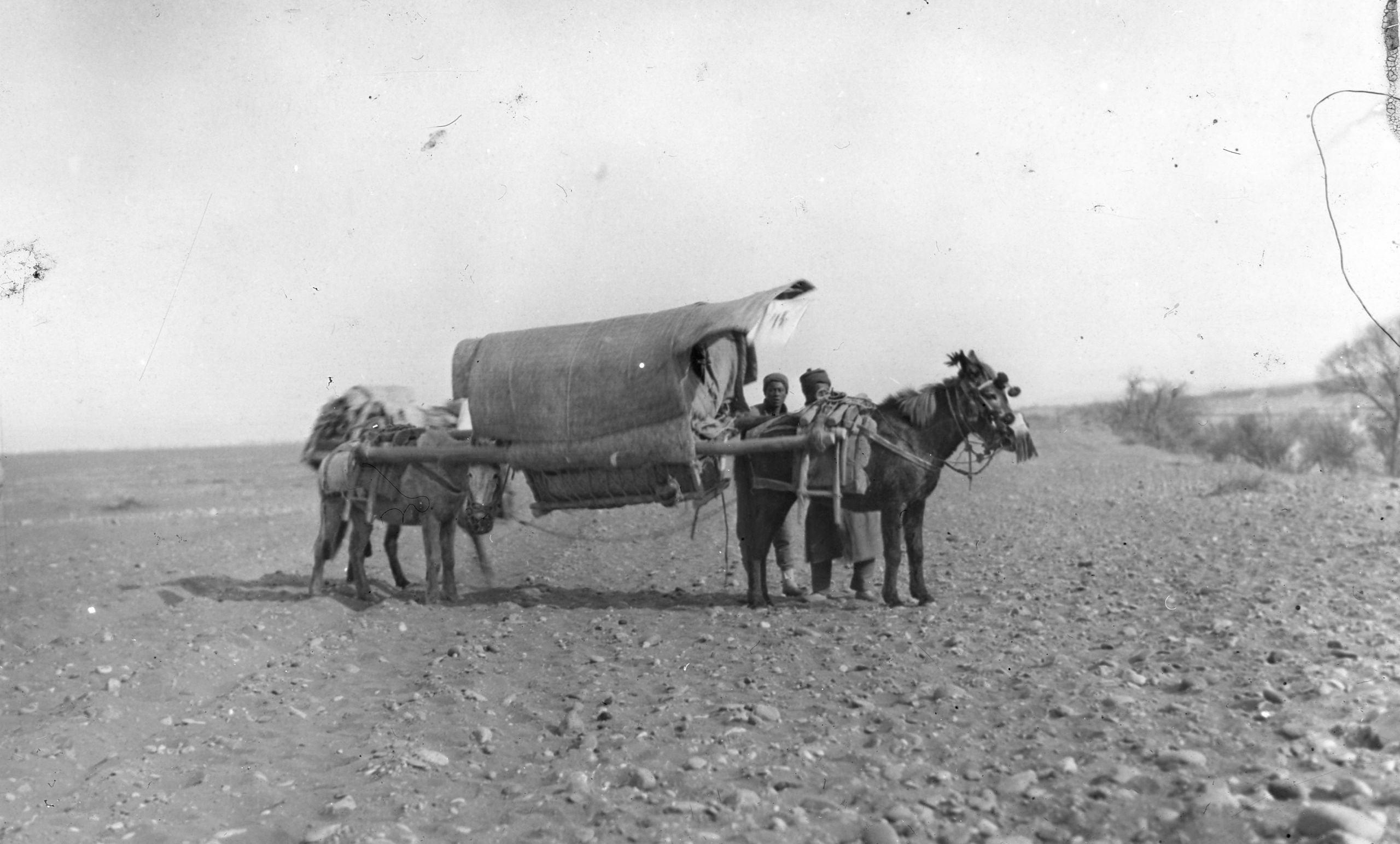

Overview
The sixth section of the journey was from Lanchow (now Lanzhou) to Pao T’ao (now Baotou). This consisted of twenty-seven stages covering about 650 miles.
From Lanchow HGT decided to follow the Hwang Ho (Yellow River), skirting the Mongolian border until they reached the ancient city of Ning Hsia, where he would have a short stop over. From there he aimed to travel across Ordos, one of the twelve major areas of Inner Mongolia, to Pao T'ao. This was the terminus of the Peking–Suiyuan railway, from where he would get the train to Peking.
This route was so well known and had been mapped so often that he decided not to continue the mapping.
Click on the above map to see the route of the journey from Lanchow to Pao T'ao and then onward by train to Peking, on a 1923 map
Click on the above map to see the route of the journey from Lanchow to Pao T'ao and then onward by train to Peking, on a 1923 map
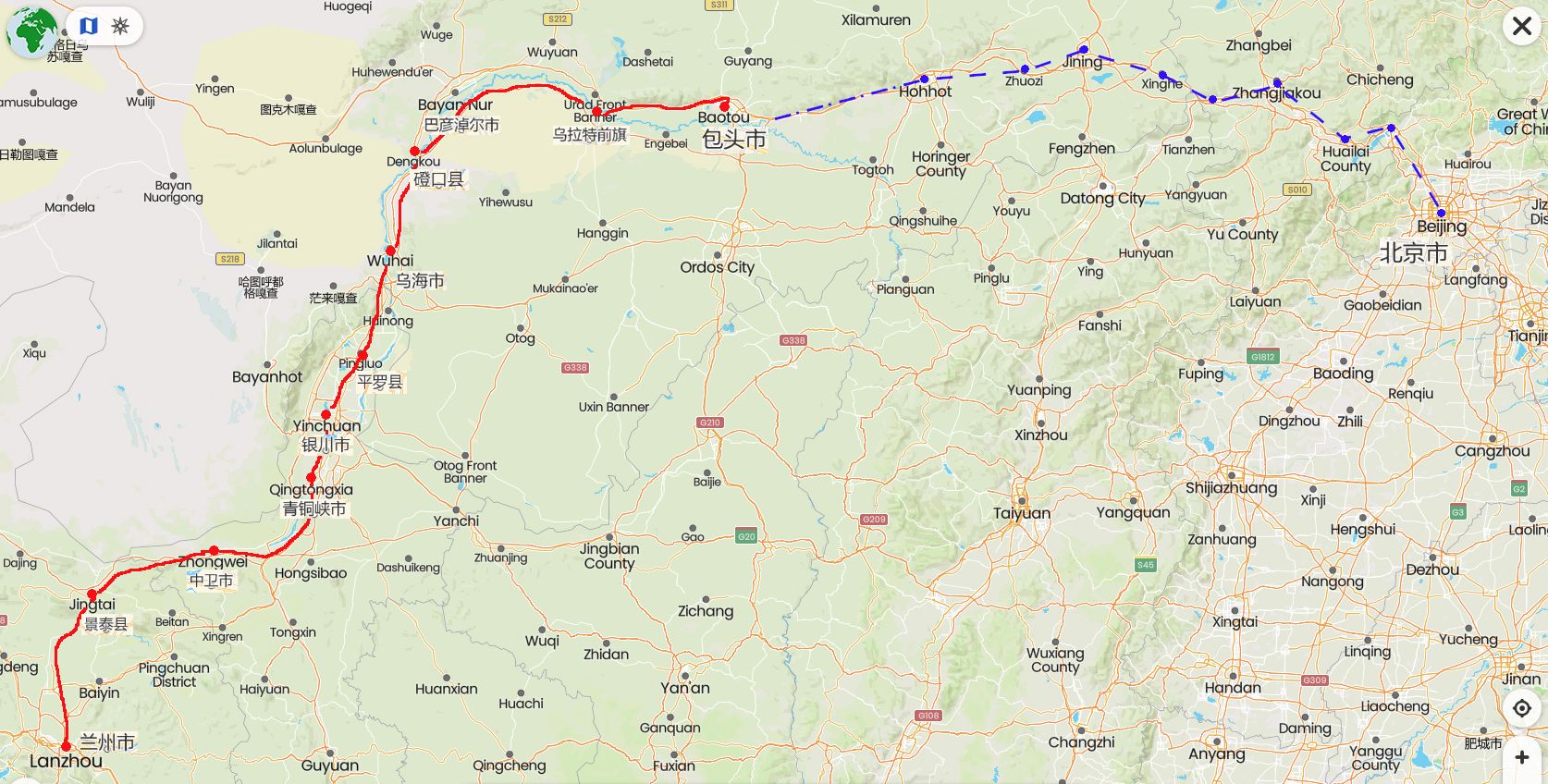
Route of journey from Lanzhou to Baotou and then onwards by train to Beijing on a modern map
Route of journey from Lanzhou to Baotou and then onwards by train to Beijing on a modern map
Day 163 December 28th, 1923 . Lanchow to Ngai Chi Kuan - 13 miles
“From Kanze, where General Pereira died, to Lanchow I have made a prismatic compass traverse of the route all the way, but having arrived at Lanchow I have decided to follow the Yellow River through Ning Hsia and Inner Mongolia to Pao T'ao - the terminus of the Peking – Suiyuan railway, and then get the train to Peking. This route is so well known and has been mapped so often that I have decided not to continue the mapping. With the help of Mr. Andrew, I obtained carts to take us through on the final section of the route”.
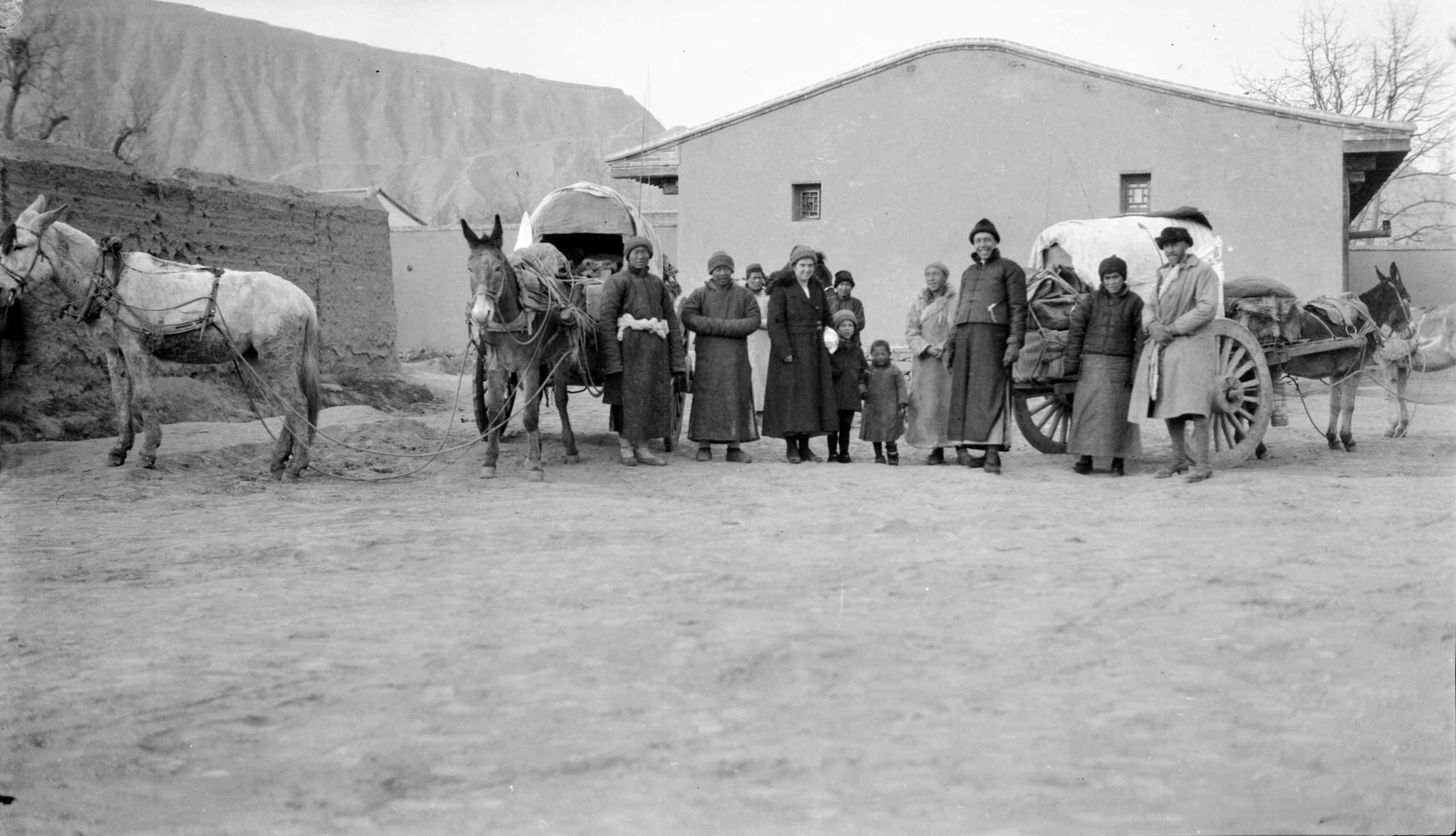
HGT leaving Lanchow being seen off by the Anderson family and others
HGT leaving Lanchow being seen off by the Anderson family and others
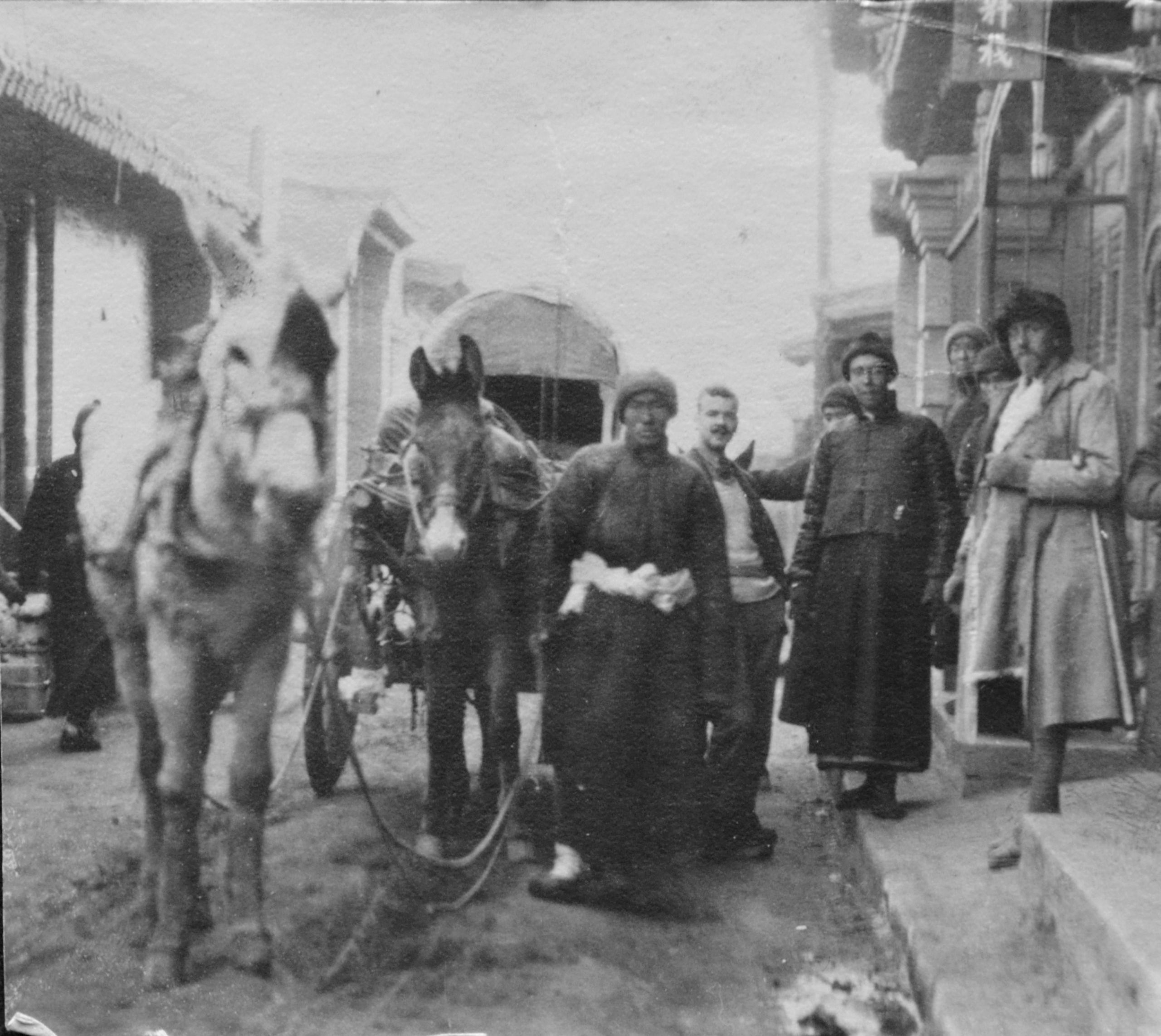
Another goodbye at Lanchow
Another goodbye at Lanchow
“We left the city at 10.30. Mr. and Mrs. Andrews and family came to the bridge to see us off. Two carts, the boy in one and I in the other, packed in with our bedding and all our baggage loaded outside. We only made a very short stage today. I was not sorry, as the jolting of the cart and the bitter cold made me feel as if I wanted to be cart sick. However, we got to an inn at at Ngai Chi Kuan at 3.30, where we stopped, to my great relief. The boy got a charcoal fire going (we had bought 50 catties of charcoal with them) on Mr. Andrews’ advice - and soon we were all “rummy”.
Day 164 December 29th, 1923 Ngai Chi Kuan to Sam Tse Tan - 30 miles
“We left at 4.50 a.m., starting out before daylight. It was very cold, but I am getting used to the cart. The road lay through low hills- no green, and everything dried up, and white with dust and sand. The dust is terrific, at times almost obscuring the path in front. It seems a long journey, and we were very glad to be able to stop when we arrived at our destination of Sam Tse Tan at 3.30 pm. – I told the carters they should go more easily in future and take another day to get to Ning Hsia.”
Day 165 Sunday December 30th, 1923 Sam Tse Tan to Sha Mo Ching - 21 miles
“Left 6,50 a.m. arrived 2.45 - a more comfortable day, bedding better arranged, hot water bottle etc., getting quite at home in the cart. The only difficulty is getting in and later, moving one's position”.
Day 166 December 31st, 1923 Sha Mo Ching to Ta lo pi - 18 miles
“Left 7.40 a.m. arrived 2.20 pm. - got comfortably settled in cart and remained snug until 11.40 a.m., then got out and walked, with occasional rides on the seat, until we arrived at Ta lo pi at 2.20. The country is very mountainous, low hills and a dusty road, but the dust not quite so bad - saw men digging out coal practically from the surface”.
HGT wrote in his journal:
“It is the last day of the old year, and my thoughts have been constantly in Yunnanfu. A hymn which has been constantly been running in my mind these last few days is:-
"When all thy mercies, 0 my God My weary soul surveys. Surmounted with the view I'm lost For wider love and praise."
“What blessings I have had on this Journey – we are now one third of the way to Ning Hsia, and I feel better than when I left Lanchow. See Daily Light - ''Hitherto hath the Lord helped us - Amen to that", - may we be more faithful in 1924 than in 1923”.
Day 167 January 1st, 1924 Ta lo pi to I Tiao Shan - 17¾ miles
NEW YEAR'S DAY. 1924
HGT wrote in his journal:
“Another year gone and another year begun! Hitherto hath the Lord helped us may we be faithful to Him!”
I "Kung Shu” ’d the boy and he "Kung Shu” ‘d" me this morning. This is the extent of our New Year celebrations”.
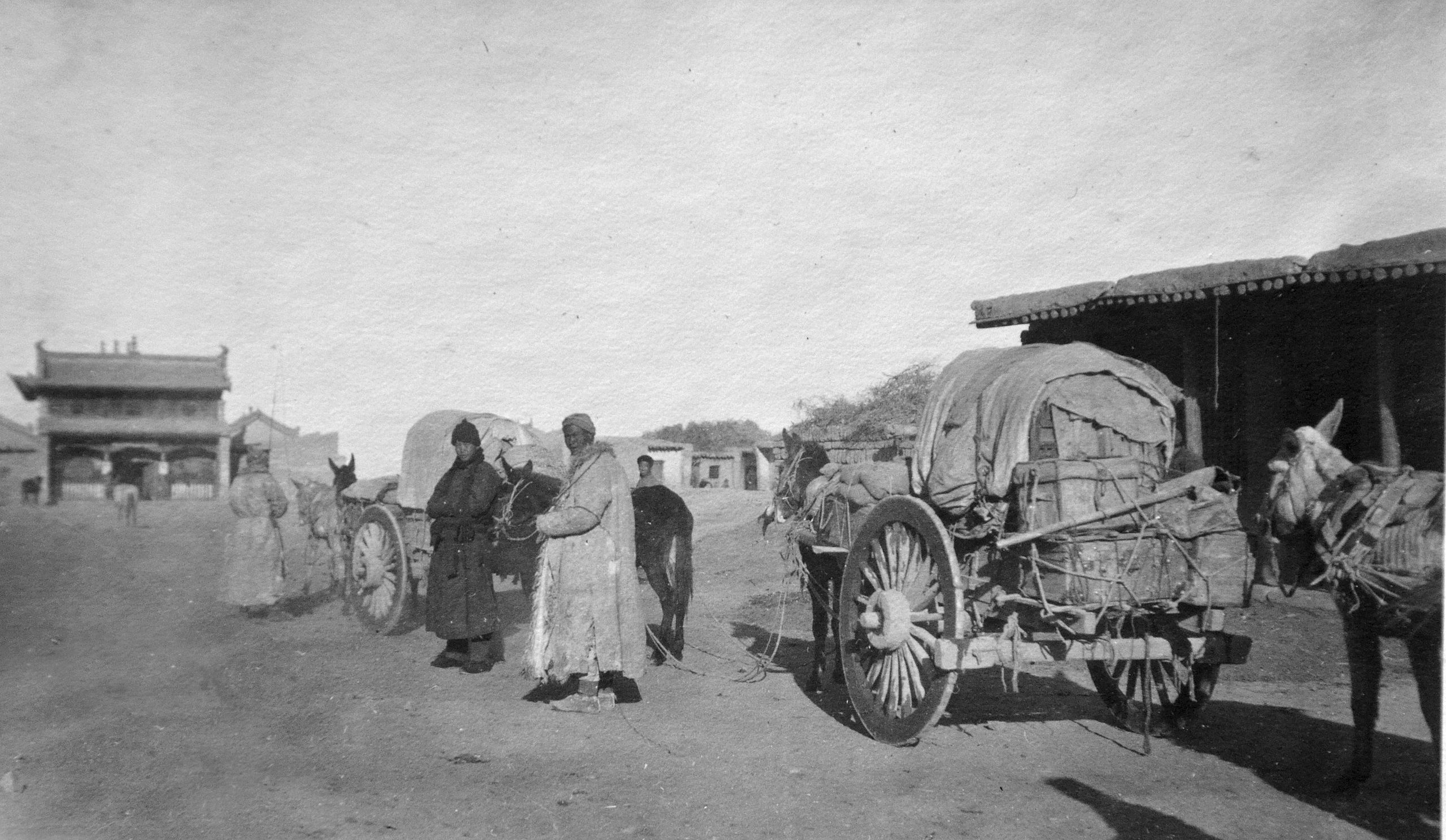
The arrival at I tiao Shan
The arrival at I tiao Shan
“We left at 7.50 a.m. and were once more, nice and snug in the cart. At 11.50 we arrived at the village of So Lau Pu (202.7 ft.), 11 ¾ miles from the start. Yesterday, I noticed soldiers at Ta lo pi, and having arrived at our destination, I Tiao shan, I noticed another 30 - 40 soldiers were stationed there”.
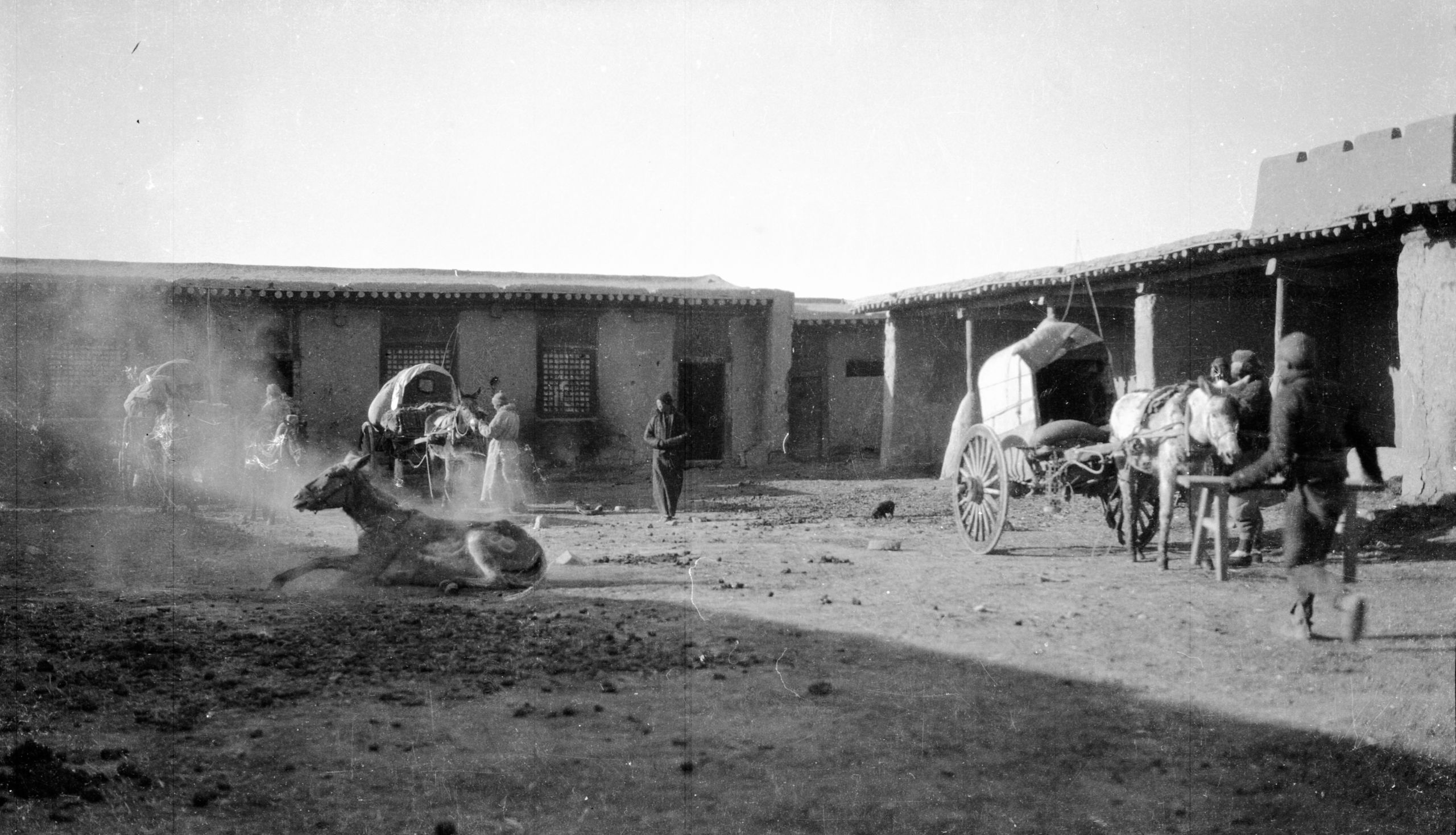
The Inn at I tiao shan
The Inn at I tiao shan
"On enquiry from the inn keeper, I was told that the road from this place to Ning Hsia was quite safe, but that the road we had traversed yesterday is troubled with bandits. We came through without knowing, as I told the boy, another token of God's goodness to us, for if we meet bandits we are at their mercy as we have no escort. I enquired whether an escort is necessary now to Ning Hsia- but was told that we are now past the danger zone. In three days, we hope we will be at Cheung Lee Hsien and then it will be 7 days more to Ning Hsia".
“Tomorrow night we shall, D.V., be half way from Lanchow to Ning Hsia. Today is a light day only 60 li, tomorrow a heavy one, 100 li. The next day about 60 or 80, depending where we stay”.
“How my thoughts go to Yunnanfu this New Year's Day and I know they will be thinking of me”.
Day 168 January 2nd, 1924 I Tiao Shan to Yung Pang Shiu - 27 miles
“Left at 5.10 a.m. A very rough road in parts, and very sandy, so heavy going. Plenty of dust from a strong West wind sprang up about 10.30 fortunately we are going NNE., so it is not in our faces”.
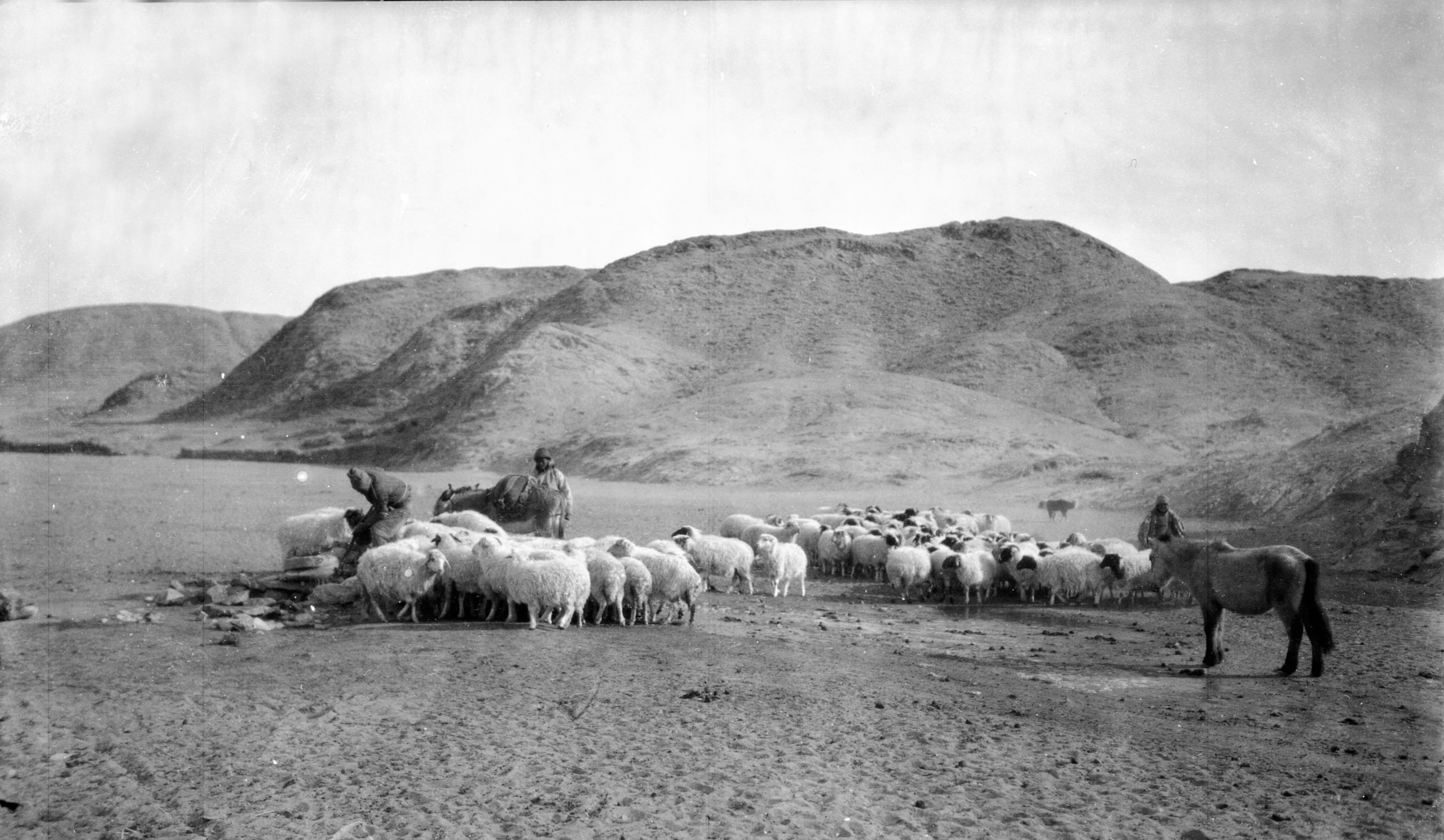
Watering sheep from a Firzen or frozen well by the roadside
Watering sheep from a Firzen or frozen well by the roadside
“We stopped by the roadside for twenty minutes at Chung Au Tsz – I reckon this is 15 miles from I Tao Shan. It is now only ruined houses - the result of a Tufei visitation 13 months ago - a well with plenty of water was being used to water several flocks of sheep”.
“I kept snug in the cart most of the morning, and then walked the last 1½ hours – On route we changed 1 mule which was sold for 70 cents, and a new one bought for $15.- rather an ancient beast, but pulls well. We arrived at Yung Pang Shiu at 3.25 pm.”
Day 169 January 3rd, 1924 Yung Pang Shiu to Kan Tang Tsz - 15 miles
Distance 15 miles
“We left at 5 minutes to 8 and arrived at Kan Tang Tsz at 2 p.m. - only a short stage because there is no inn for another 12 miles and the road is very heavy going with sand. Even with the short stage, the mules are sweating heavily - and quite tired. It means we will need another six days to get to Ning Hsia Fu”.
“In two days time we hope to reach Chung Wei Hsien where I will try and buy two mules so as to speed up our journey somewhat”.
“The muleteers reckon we could get them for $40. It will cost about 60 cents a day for food and on reaching Pao Tao, we can sell them for at least $30. - and we ought to save three days at least on the road. If we have an escort from Ning Hsia (which seems desirable), we ought to save about $10 escort money - so our total net cost should be about $10 to $15 which if we can save three days is well worth it - for it may mean reaching Hong Kong by Chinese New Year instead of being held up in Shanghai”.
“This (Kan Tang Tsz) is a tiny place consisting of three rest houses or inns. The country road is mostly flat with occasional low hummocks which the road cuts through or goes over - there are low hills to the East, evidently bounding the Yellow River Gorges - as shown on the map and there are low mountains to the North West - the boundary of Kansu. The small river beds are all dried up, fortunately, and the plain is covered with a low scrub, only about 5 to 6 inches high. It is still bitterly cold at night and early morning but after 9.30 a.m. the sun warms things up and there is no wind, it is quite mild (in the sunshine!).
Day 170 January 4th, 1924 KanTang Tsz to Tsang Luk Shui - 22½ miles
“We left at 6.30, and arrived at Tsang Luk Shui at 3.15. After 1¼ hours we had a rest at I Wan Chuan Tsz, 12 miles from the start. The country has been all loess or sand, with patches of low scrub 6 inches to one foot high. Today there was a stretch of sand hills - 3 miles across - very loose sand and heavy going. Tsang Luk Shui was the first proper village we have seen since So Lau Pu, 2½ days ago".
Day 171 January 5th, 1924 Tsang Luk Shui to Chung Wei Hsien - 25½ miles
They started out at 6.05 a.m. - following down the frozen stream on which Tsang Luh Shui was situated, down to the Yellow River. It was very heavy going - the track following the bed of the stream - and the carts being dragged over cobbles. The carts were jolting so much they were glad to get out and walk.
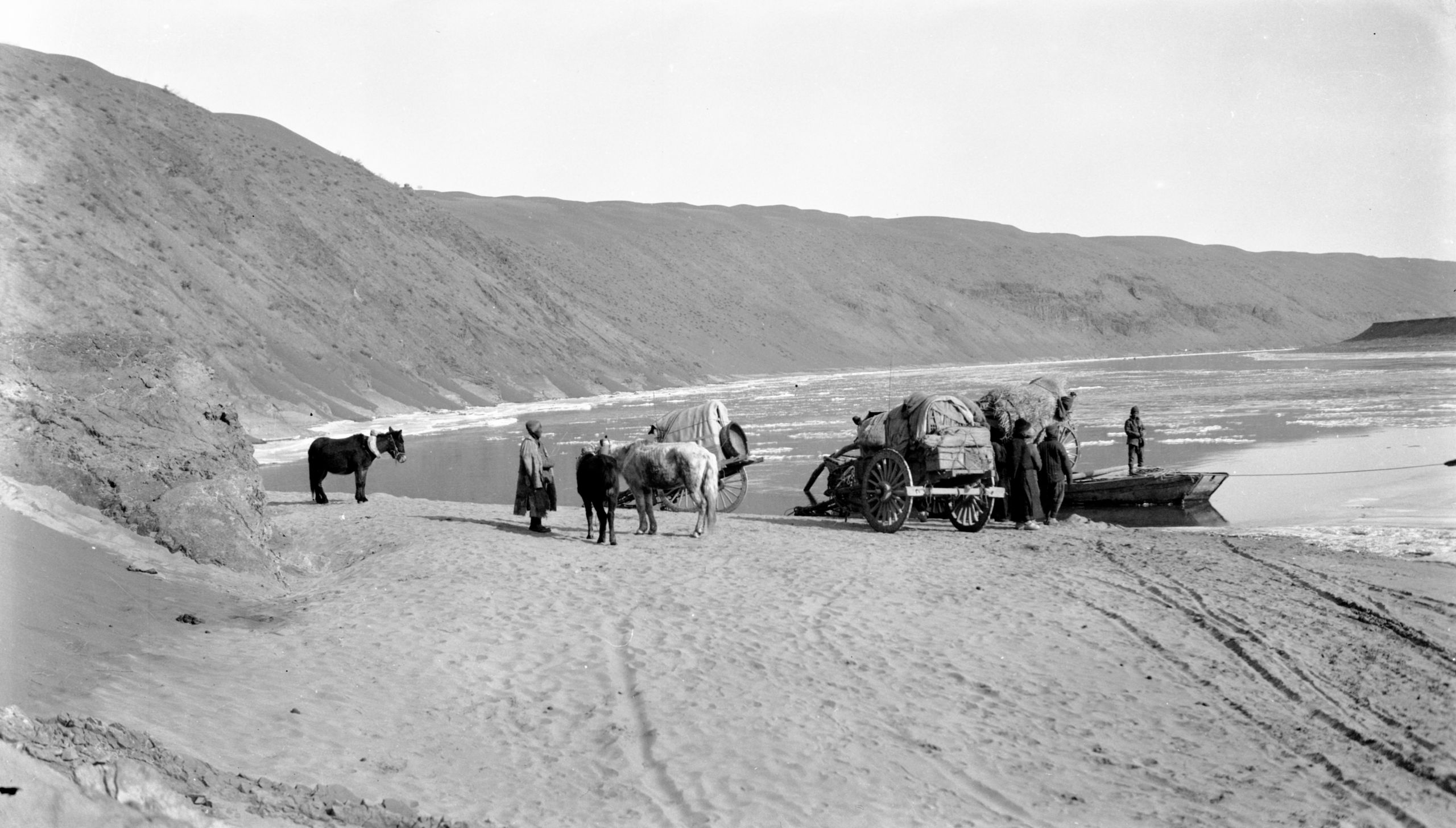
The carts preparing to be loaded on to the ferry over the Huang Ho (Yellow river )
The carts preparing to be loaded on to the ferry over the Huang Ho (Yellow river )
“At 9.15 we had followed the Yellow River (left bank) to a spot where it became very precipitous and the carts could go no further. The custom at this spot is to summon a ferry boat from about one mile farther down, place the carts on the boat, which then transports them past the cliff part, while the mules picked their way along the cliff base. Fortunately, the ferry boat was about half way back bringing a cart that was then proceeding to Lanchow. There were five trackers hauling the boat”.
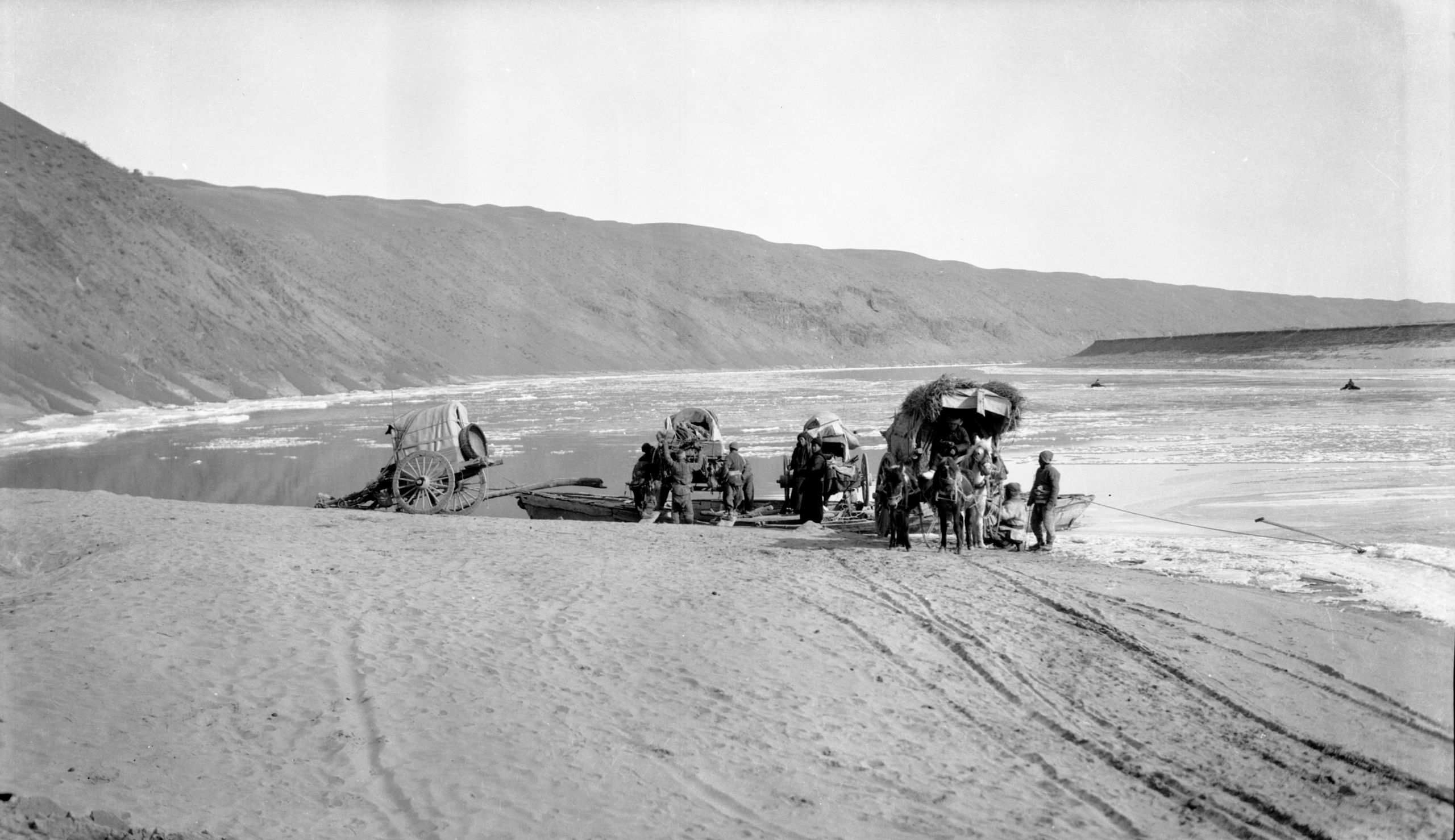
As the carts were boarding the ferry. Two coracles can also be seen crossing the river
As the carts were boarding the ferry. Two coracles can also be seen crossing the river
“It took 2½ hours from the time of our arrival at the ferry till we landed and harnessed up to go on. At 11.30 we continued on our way and entered the big open plain in which Chung Wei is situated. At 4.50 we arrived at the west gate. Chung Wei (3,500 ft. – B.T. 205°) is a walled city of, I reckon, about 15,000 inhabitants”.
“There are one or two arches, quite picturesque over the main street, but everything is covered with a grey dust. We obtained a comfortable and clean room at an inn outside the East Gate and after a wash I went to call at the Gospel Hall where I was cordially welcomed and had supper.
HGT wrote in his journal of the people he met:
“Mr. Elliott is of the Church of the Brethren (very like the Plymouth Brethren). Mrs. Elliott is a Medico from Toronto and is doing a lot medically to help the people. Miss Alice E. Evans is with them, an old student at the Everton Training Home”.
“Mr. Elliott asked me to examine his wife who had a facial tumour. They had been discussing for two days the advisability of going to Lanchow for advice - but Mrs. Elliott dreaded the cold journey of nine days”. I advised them to go to Peking U.M.C. Hospital as soon as they could manage, which will probably be in about three months. As we left, I was given a packet for the journey - it was breakfast chocolate. I had just finished my supply two days earlier and I was very glad of this as using it once a day would see me through to Pao Tao. Thus were my needs supplied (!!!) although I had declined all offer of stores for the rest of the journey feeling that I could manage”.
Day 172 Sunday January 6th, 1924 Chung Wei Hsien to Shih Kung - 25½ miles
“We left at 6.30 a.m. and arrived at Shih Kung at 4.25 p.m. We had one stop of 20 minutes at 9 miles out, and another for 10 minutes at 15 miles out. The road continued across this plain which borders the Yellow River. Shih Kung is just at the place where the road meets the River again. Nothing of note today - a continuous series of small villages at a few li intervals. Our mid-day halt was at Li Chi Sha Woh”.
Day 173 January 7th, 1924 Shih Kung to Kwang Low - 31 miles
“We left at 5 a.m. and arrived at Tsao Yuan at 9.25 where we rested till 10.40. We arrived at Chu Kow at 1.50 p.m. before reaching Kwang Wu at 4.30 p.m. A very heavy day. The road was hard going - nothing else of note”.
Day 174 January 8th, 1924 Kwang Low to Yeh Shih Pu - 28 miles
“We left at 6 a.m. feeling rather “cheap”, partly due I think to the Chah Tsz Tau fire in my room last night. - rested for 1¼ hrs at mid-day at Tapa and got in to Yeh Shih Pu at 4.50 p.m. and went straight to bed - took a dose of Ol Rum and felt better - had a good night and felt much better for abstinence from food”.
Day 175 January 9th, 1924 Yeh Shih Pu to Ning Hsia - 25 miles
“In much better condition”
“Left at 6.30 a.m. The road from Yeh Shi Pu. Road was much better and the mules trotted for part of the day. We had a rest for 1¼ hrs at Yen Ho Pu on the way and arrived at Ning Hsia at 4.15 p.m. A warm welcome here from Mr. & Mrs. Fiddler and Mrs. Nistrom (C.I.M.). Mrs. Fiddler (formerly a Miss Way) was one of the few survivors of the C.I.M. Missionaries caught up in the Shansi Boxer troubles. Mr. Fiddler had been out seven li to meet me two days earlier, but being delayed on the road, of course I didn’t turn up”.
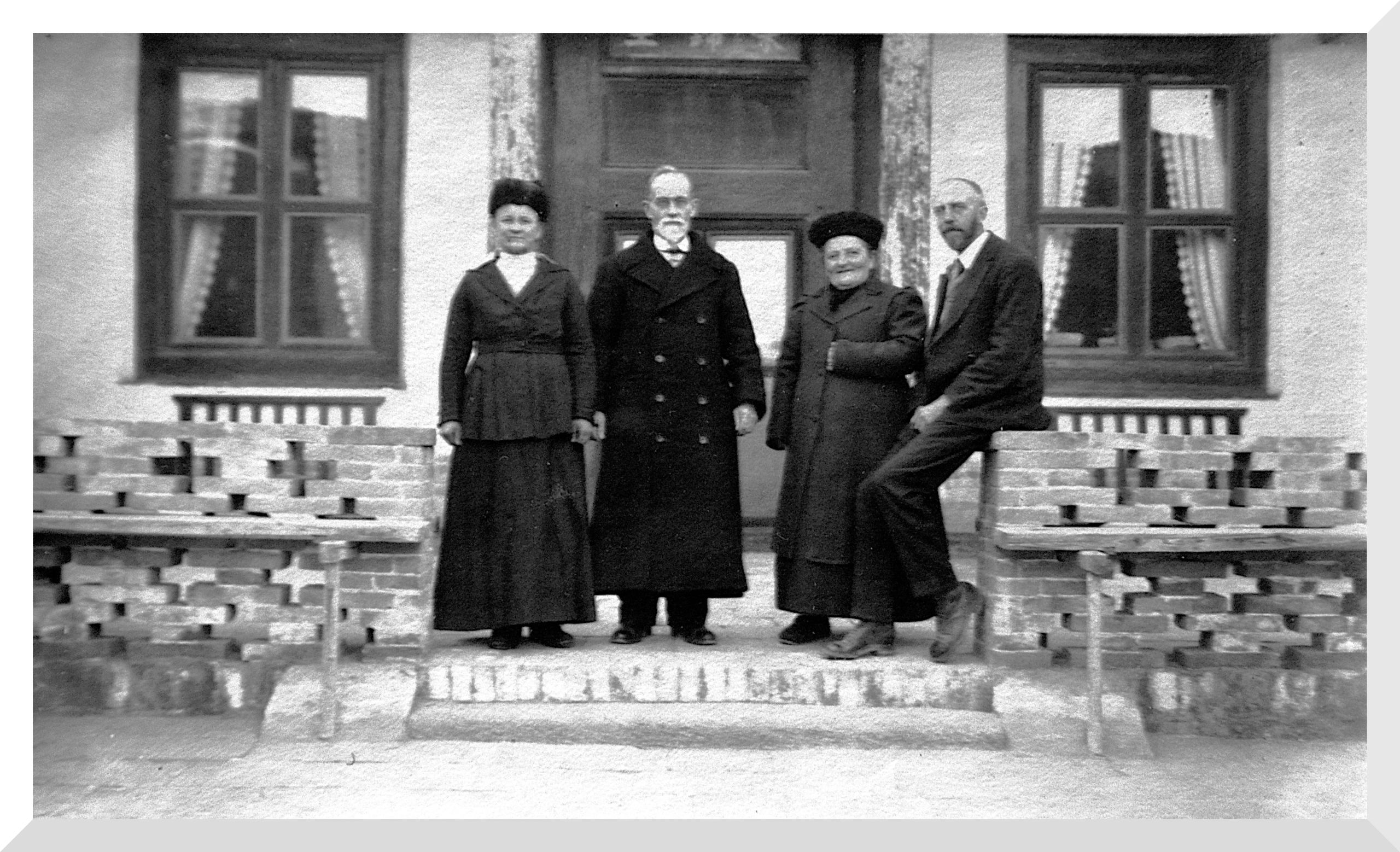
HGT with Mr. & Mrs. Fiddler and Mrs. Nistrom at Ning Hsia
HGT with Mr. & Mrs. Fiddler and Mrs. Nistrom at Ning Hsia
“Ning Hsia, a large walled city, has a prominent pagoda inside the city and another to the north. Thirteen miles to the west are the Alashan (Mountain range) beyond which is the Gobi Desert”.
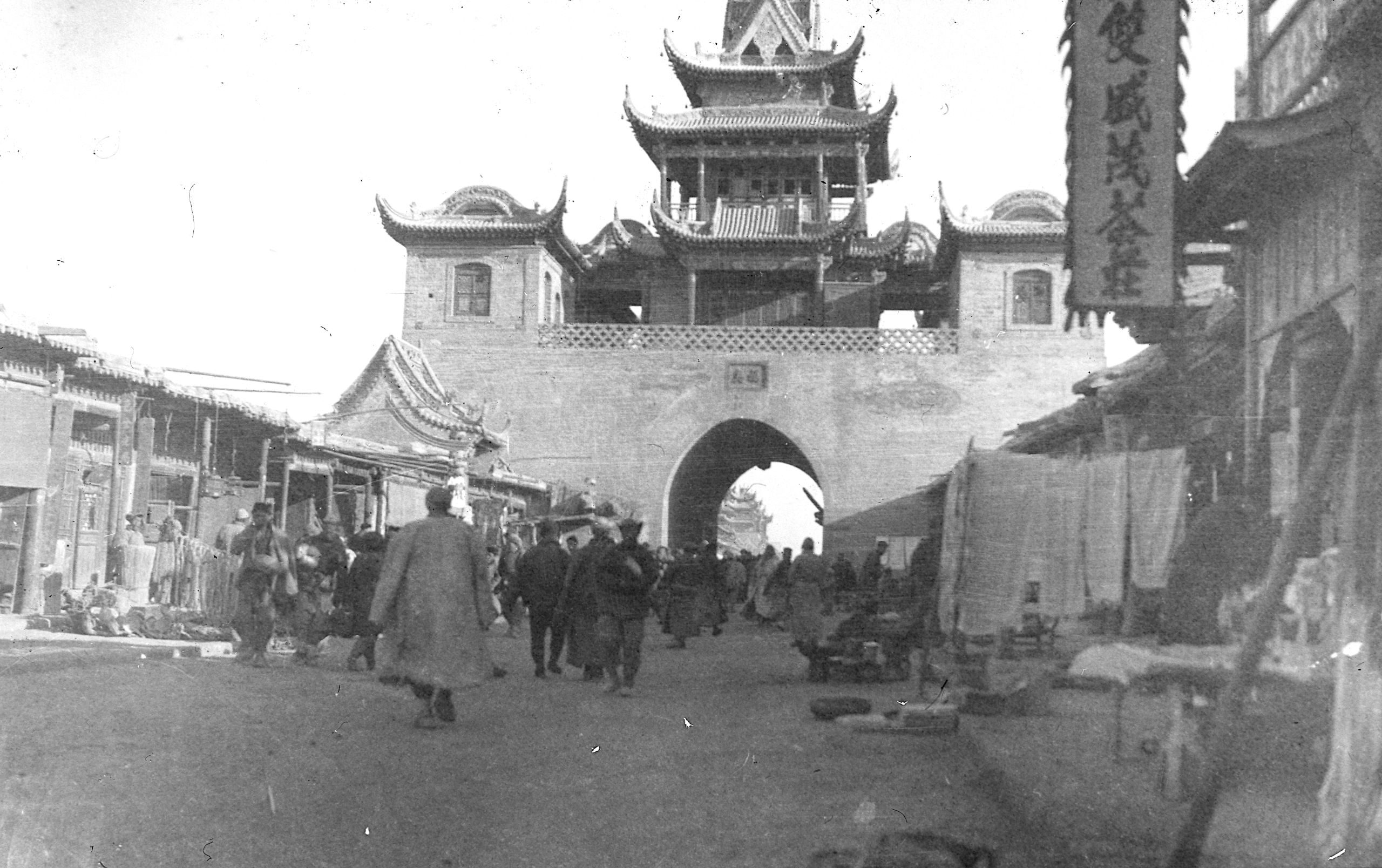
Ning Hsia City gate
Ning Hsia City gate
“I am calling on the Official this morning and arranging for an extra horse for each cart for the journey to Pao T’ao, which I hope to make in 12 days. I also went to the R.C. Mission in the morning and spoke to the men, about 12 in number. This is a great place for carpet and rug making. I am going with Mr. Fiddler to see the carpet factory".
That evening, HGT wrote in his journal:
“I really feel that we are getting on to the last stage of our journey. At any rate, after Pao T’ao it ought to be more comfortable - and free from risk of robbers”.

Panorama of friends at Ning Hsia
Panorama of friends at Ning Hsia
Day 176 January 10th, 1924 Ning Hsia
In his journal HGT wrote:
“A quiet day, visited carpet factory, R.C. Mission saw two patients and took some photos - wrote letters, bought two extra ponies and one ran away and cannot be found. Visited General Ma - in charge of City.
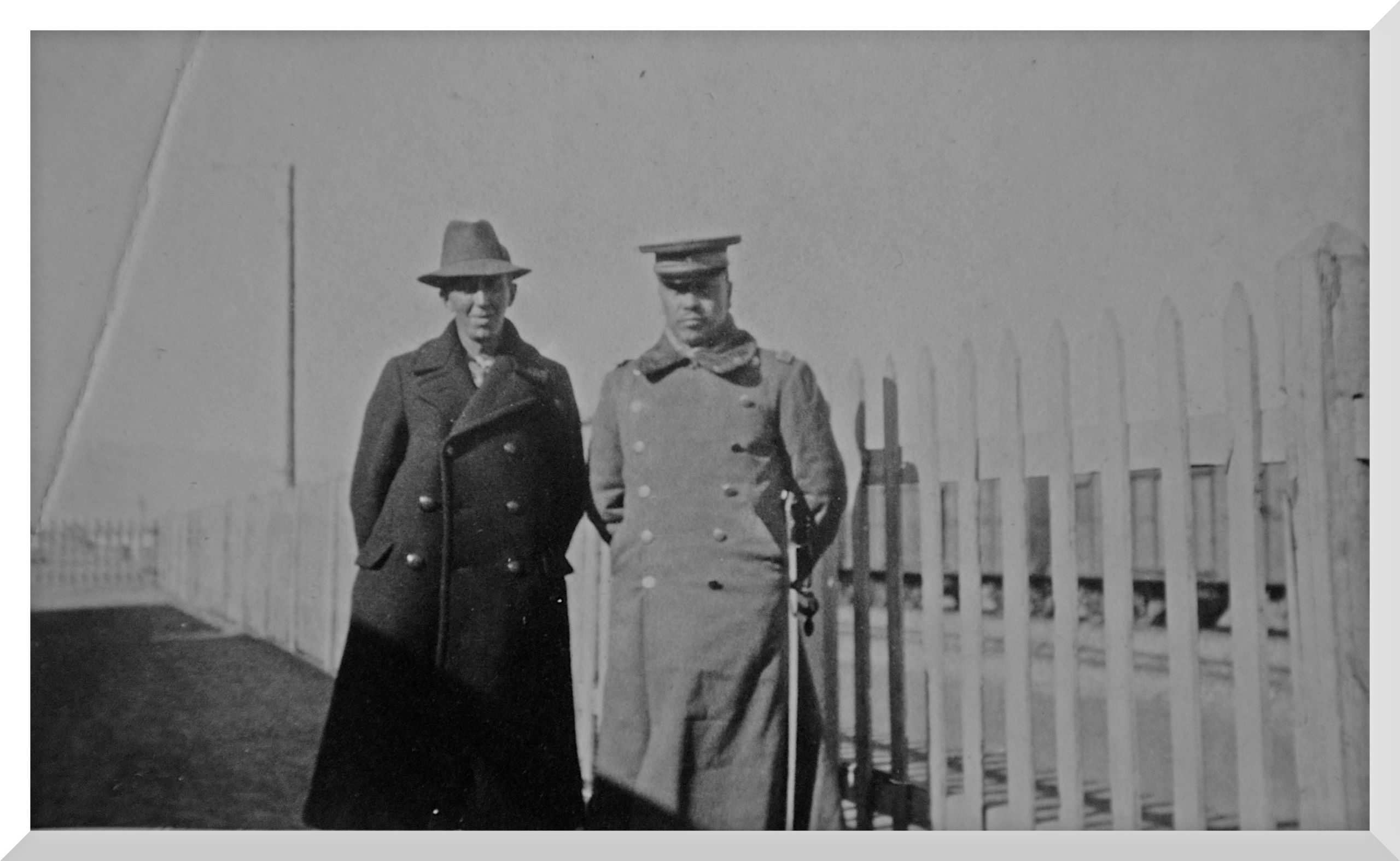
General Ma Fuxiang with HGT
General Ma Fuxiang with HGT
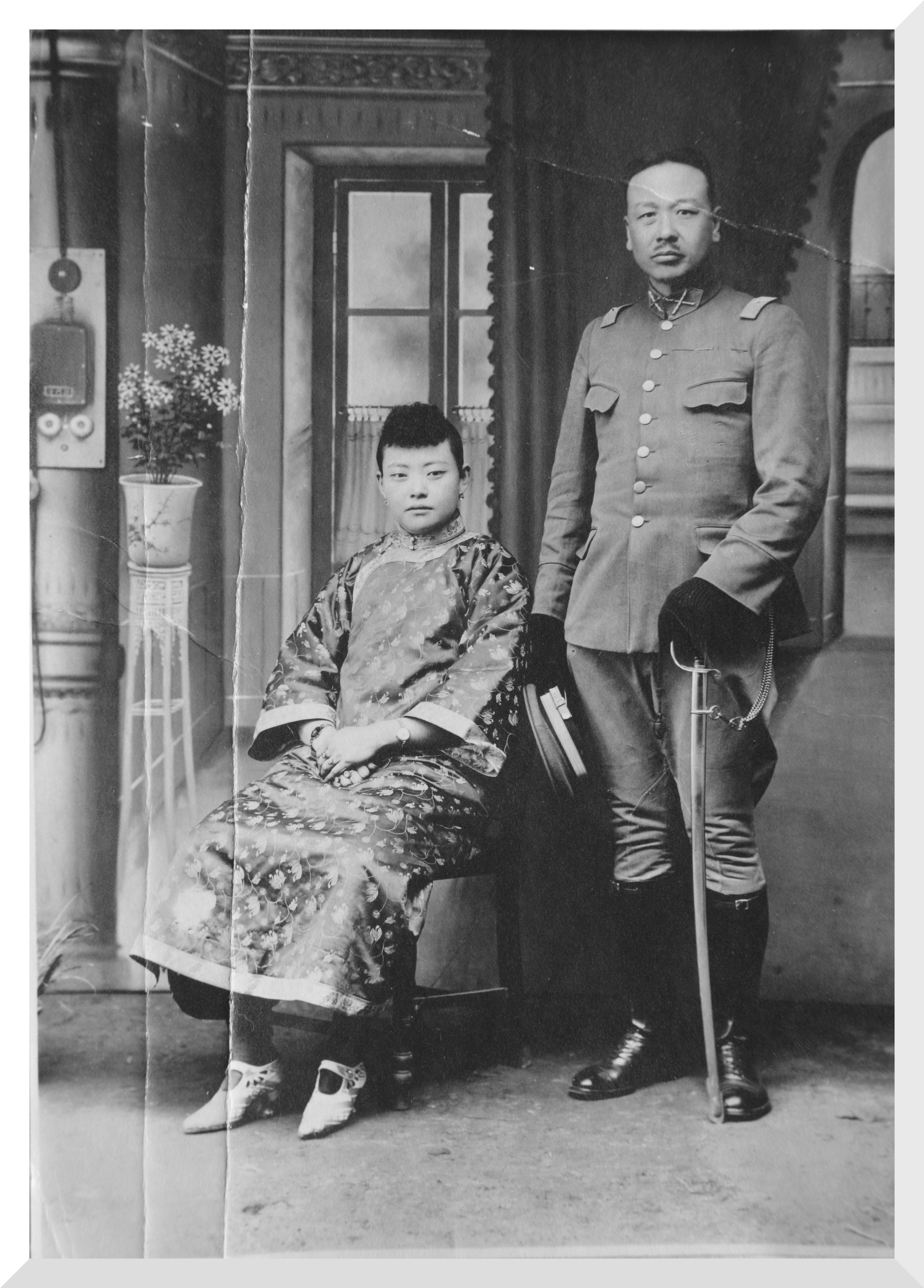
Portrait of General Ma Fuxiang and his wife
Portrait of General Ma Fuxiang and his wife
Information on wikipedia on General Ma Fuxiang
In his letter home from Ning Hsia, HGT wrote:
Ning Hsia
January 10th 1924
My dearest Sweetheart,
My heart goes out in love to thee - and now I am one stage nearer to being with thee again. I arrived here last evening and now am having a day’s rest before going on again. I would like two or three days - but I want to push on through - otherwise I shall be held up at Peking or Shanghai over Chinese New Year and I want, if it is at all possible, to reach Hong Kong for Chinese New Year. The folk here are most kind, in fact, everybody along the road have loaded me with kindness, which of course I cannot repay. I had a tub last night - the first since Lanchow, 13 days ago. It was good to get one's things off and have a soak and get into clean clothes and then into bed - a proper bed, not a camp bed.
I slept heavily and dreamt that Pereira was not dead, that it was all a mistake and he had revived again. It took me quite an effort to rouse myself and realize that I really was alone and that he was really dead.
I am going with Mr. Fiddler to call on the Official and then to the carpet factory and will see if they have anything in stock. This place is noted all over North China for its Rugs - but most are made to order.
I do not know if I may find it is too hard going but I am going to try and get to Pao T’ao in twelve days, then two days to Peking, and I do not know how long I shall be there. I hope not more than three days, fixing up Pereira's affairs. Then I want one day in Shanghai which means I may get the Pacific Mail Steamer, "President Grant" advertised to leave on February 1st and get to Hong Kong for Chinese New Year. All depends on whether I can get through to Pao T’ao in twelve days. It can be done - but it means hard going, and if I find it is too much of a racket I will have to slow down and take fourteen days. However, I will wire you from Peking or Shanghai which day I hope to leave Shanghai.
Just imagine by the time reaches you, I may be in Shanghai or even Hong Kong.
My dear dear love to thee and heaps of kisses to thee and the little folks,
Thy loving boy,
Hubert.
The boy has just been in to say that they have bought the two extra ponies -so we ought to reach Pao T’ao in twelve days alright.
Best love,
Hubert
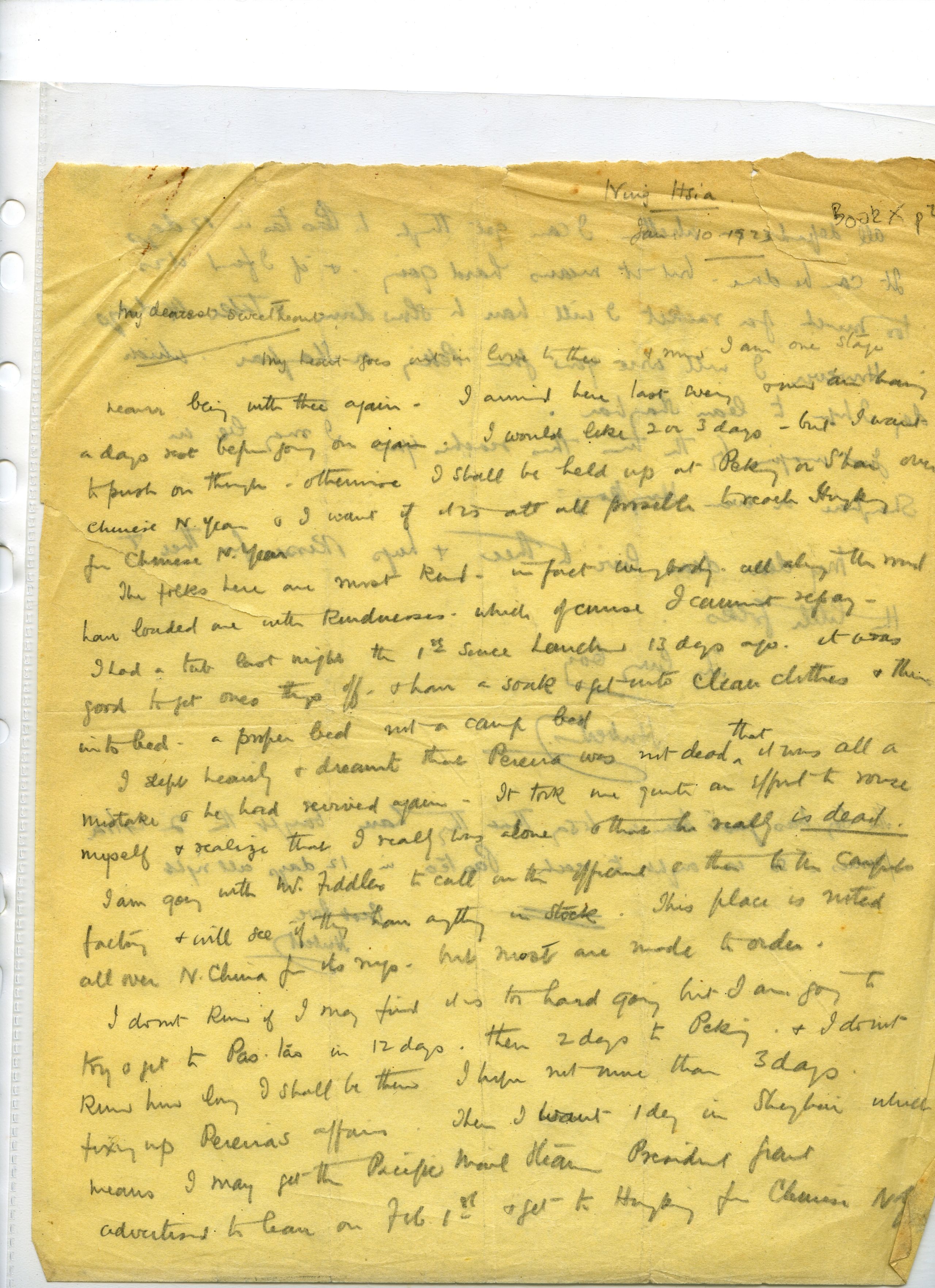
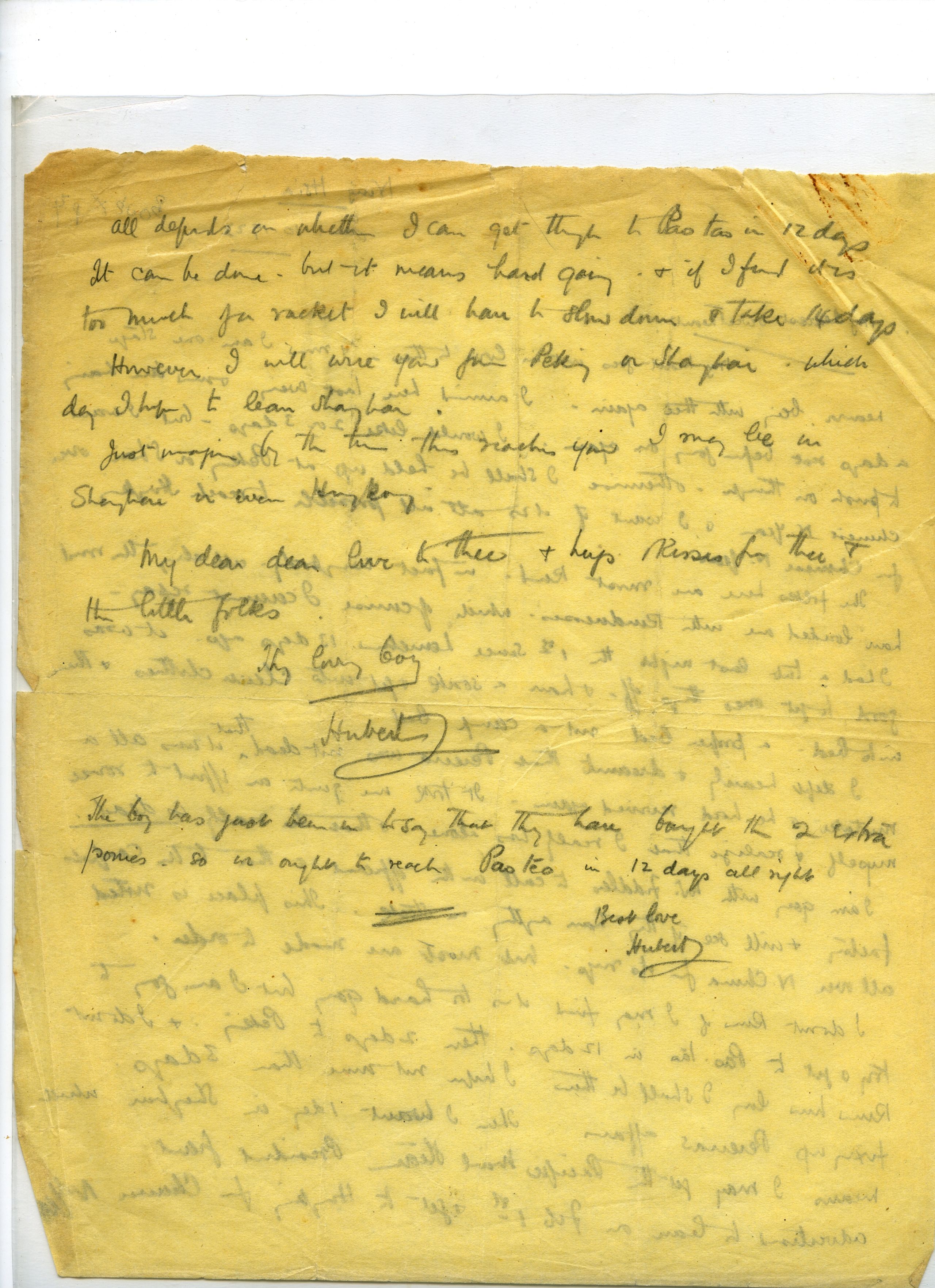
Day 177 January 11th, 1924 Ning Hsia
In his journal HGT wrote:
“Delayed by missing pony - went to P.O. and then wrote and read papers. Went to part of meeting (Week of Prayer) At 2 p.m. - pony found but now too late to start.”
In his next letter home from Ning Hsia, HGT wrote:
Ning Hsia
January 11th 1924
"My dearest One,
We bought two ponies (extra ones) yesterday and the boy brought them round and tied them up just outside the gates of the C.I.M. Mission. Shortly after, one had disappeared, and the report was that it had broken loose and run away. There has been a search made but so far with no result and I fear it has been stolen. However, it was only $27.- so it is no use worrying, and if by 11 o-clock he is not found I have decided to buy another and push on. This has meant a delay of 1 day but it cannot be helped.
The Official here says that the road is not very safe near to Pao T'ao - but it is a choice of evils for one may meet with Tufei on any road between here and Peking, and this is the shortest road to the Rail Head, only 12 days, and 5 or 6 of these are quite alright - so as carts are also arranged for and everything is fixed up - after careful thought I have decided to go on - but go carefully. We are having an escort but of course if one meets a big band an escort is not much use. There is one thing about the gentlemen on this road. They don't seem to want people, only their goods - so even if we meet them and lose our stuff, which would be a nuisance - probably we should get through alright. At any rate, I will wire you from Peking or Shanghai and then you will know the last stage of overland journey is completed.
Dearest one, remember always three words which come in Daniel 3 v.17 and 18 – “But If Not” -
Our God -whom we serve is able to deliver us
But if not
We will still strive to be faithful to Him, Last night talking to the Official, Mr. Fiddler told him that we trust in God for protection, and afterwards thinking about it I thought of Dr. Howard Taylor in the hands of the bandits. Why was he not protected from falling into their hands? Why were all the missionaries martyred in the Boxer Year, and then this text came to me which I remember Stewart Holden preached on once at Keswick .
“Our God is able but if not, He can protect and preserve us, but if He sees fit not to do so, then Lord keep us faithful whatever happens.”
There is between here and Pao T'ao an R.C. Mission Station and a Dutch Mission Station - so we ought to be able to find out the condition of the road as we go along.
Now I must stop this scribble.
With lots of dear love, hugs and kisses to thee and the dear little ones,
From your own boy,
Hubert.
Later - The boy and one of the carters has just been in, talking over the pony matter, when a man came running in to say he believed the pony was found near the East Gate - so all being well we get off in two hours and do half a day's journey - this will ease off the next three days strenuous journey. If by any chance we do not get off I will add to this letter. If nothing is added you will know the pony is really found and we are off and God bless you each one.
Your boy,
Hubert
Still later - The pony is found but it is now too late to leave today so we are off first thing in the morning - daylight. This means we have lost a whole day but I believe the Master has some good reason for keeping us back an extra day. Lots of love,
Your boy,
Hubert.”
Day 178 January 12th, 1924 Ning Hsia to Ping Lo Hsien - 32 miles
“Good road - at 8.30 - arrived at Li Ka Kang Pu at 12.40 (12 miles) - rest till 1.40 p.m. - arrived at Ping Lo Hsien after dark, at 7.15 p.m. - had to get the city gate opened. - staying in a small quiet inn - did not get to bed till nearly eleven o'clock”.
Day 179 January 13th, 1924 Ping Lo Hsien to ShetSui Shan - 26½ miles
“Left at 7.20 - arrived Hwang Chu Chiao at 10.20. Rest till 11.30, - arrived Shih Tsui Tzu at 5.20 - staying at a good inn at north end of town. Sent in the document supplied by General Ma - from this place to have an escort again. They are sending either two or four soldiers tomorrow”.
“If we make Pao T’ao in 12 days - we are now one eighth of the way - according to stages. Hurrah - we shall soon be there (D.V.). Today's hymn "Peace perfect peace."
“This is the place where Pereira joined the road after crossing the Ordos in 1911. The Abbé Hue also passed through here on his travels. The road is distinctly better and there are good stretches of level going - occasional sand - a good inn - a fair sized market town”.
Day 180 January 14th, 1924 Shih Tsui Tzu to Heh Kwei Tze - 24⅓ miles
“A single inn on a small bend, of Yellow River - a very lonely spot, only one other broken down farm house at this spot”.
Day 181 January 15th, 1924 Heh Kwei Tze to T’ong Kow - 33 miles
“We left at 7.10 a.m. but lost time at their midday halt as the way into the inn was locked up and the owner had to be found - took some photos of the mules feeding etc. and bagged a nice plump pheasant. Got in late to T’ong Kow - the last 7 miles travelling by moonlight. A small town of about 2,000 inhabitants, and a nice inn on the River bank”.
“The proprietor is most kind and very grateful for medicine for his son. This is a great centre for wool etc. being brought in by camel and then sent on to Pao T’ao by boat.
Day 182 January 16th, 1924 T’ong Kow to Li Liang T’al - 31 miles
“After 31 miles, we reached Li Liang T’ai, a Roman Catholic village fed with water by a canal from the Yellow River (an R.C. funded scheme.)
“On the road today only passed-by three houses all the way. Flocks of sheep and young camels, and many camel caravans - the largest 70 to 80 in strings of 10 to 12. At the mid-day rest place Sha Lui Kwei, 3 Mongol horsemen came up but they were unarmed and appeared friendly. They said the road was quite safe on to Pao T’ao. If this is correct - as from all accounts seems likely - this is good news”.
“Tomorrow evening we shall be practically ½ way - (at any rate as far as stages are concerned). We hear that Ma Fuh Kwaan, for whom I have a letter, is not at Tao li to. So if this is confirmed at Ta T'an we shall not go there but go direct to Kwong Yang Mo To. All seems peaceful thus far. – ‘Thou wilt keep him in perfect peace whose mind is stayed on Thee because he trusteth in Thee’”.
Today's hymn –
“One thing I of the Lord desire” etc. –
“So, wash me now without within” etc.
Day 183 January 17th, 1924 Li Liang T’al to Or Lan Mo Toh - 30 miles
“Nothing much to note until at Tung T'a the big mule in the shafts of the boys’ cart collapsed. Fortunately, we were at the gate of a big camel depot so decided to take their midday rest. A local man advised a dose of opium which, was mixed with rice and given to the mule. After about 1 hour the mule revived and began to eat and at 2.10 p.m. (2 hours after collapse) he was pronounced ready for the road again, though he looked rather sleepy”.
“We arrived at Ta Taan (Taitunsze) - a walled in soldiers' fort, at 4.30 p.m. Here we found out that Ma Fuh Kwaan, for whom I had a letter from General Ma at Ning Hsia, was at Or Lan Mo Toh (said to be 15 li away) and off the main road. Decided to push on and reached there at 7.20 p.m. Ma was very nice and, although he had no room to give us, yet made us welcome. I slept on my camp bed on a nice warm K'ang with 5 other men (Chinese). He (Ma) promised four soldiers as escort to Wu Heh Hsien where we get a fresh batch to see us through to Pao T’ao”.
“Apparently, the Mongol bandits come in big bands of 400, 500 or 600 but as they were only a week ago driven across the Yellow River to the Ordos country - we are likely to get through without trouble, though they can never be certain when and where these bands will appear. However, Ma smilingly told me that they seem to leave foreigners alone - as they say they would not loot foreigners’ things as they are friendly with them but Chinese they would rob without hesitation”.
Day 184 January 18th, 1924 Or Lan Mo Toh to Ho Chien - 24 miles
They left Or Lan Mo Toh at 7.50 a.m. and travelled through to Hwa Yang Mo Toh where there was a R.C. Church and priest who had been there for 23 years.
“The mule seemed all right today”.
“We had our midday rest hour and I called in and saw the priest. He is a Belgian and gave me in French and Chinese some details of the route from there onwards. He confirmed the fact that the bandits here come in big numbers - He also told me that yesterday a big body of soldiers passed through returning to Ning Hsia from Pao T'ao where they had been sent to convey a big lot of opium".
They travelled on and after 24 miles reached Ho Chien.
“If all goes well we ought to reach Wu Yieh Hsien the day after tomorrow and then we will be only four days from Pao T'ao”.
Day 185 January 19th, 1924 Ho Chien to Wu Chia Ti - 36 miles
Day 186 January 20th, 1924 Wu Chia Ti to Wu Yieh Hsien - 26 mile
“We left Ho Chien at 6.15 a.m. and passed a Mongol Lamasery called Chen Chia Miao at 9.30. The country is very flat and moor-like with occasional pheasant and grouse. After a rest at Mung Yei Yu Fong, the villages began to be more numerous”.
“A man whom the escort intercepted said there were Tufei on the road ahead and that they had visited Wu Chia Ti the night before”.
"We proceeded keeping on the lookout. On turning the corner of a low hill with some bushes, the escort saw a number of horsemen at a village ahead. On one of the houses a white flag was being flown. We waited with the carts concealed by the spur of hill. A man came up and said he was one of the inhabitants of the little village and that 16 armed men had ridden up and the villagers had all bolted for the country. He did not know if they were Mongol soldiers or Tufei. He could not explain why the white flag was being flown”.
“Our escort got very excited especially one man and they had a long consultation till I said I was going ahead. They then advised a detour of about ¾ mile to miss the village. This we did and the carts jolted their way over fields and ditches (fortunately frozen and so, dry) until the main road was rejoined about 1½ miles beyond the village with the white flag. The soldiers hustled our drivers and we pushed along. About an hour later they reported a cloud of dust following us and they believed there were horsemen following. We were hustled along till it became dark".
As the mules were getting tired, HGT proposed that they should stop at the next possible place, rest a few hours for the mules' sake and then push on by moonlight.
“We arrived at Shen Wen Koh where we had planned to stay the night, but the soldiers who were very excited said – “No, no, no - they are after us - there is no wall to the inn yard - we must push on”. So, on we went to Wu Chia Ti – a total of 36 miles. It was 8 p.m. and a good inn with a good yard and high wall. Once again, the soldiers said they should push on but I put my foot down and said “impossible, we shall have the mules collapsing by the road and we all want food. If these folks are still after us let them come up here”. So, we turned in to the inn yard and all had a good rest. I had had a sleep in the cart, and after a good meal I got a blanket and a pillow lay on the k'ang and went to sleep”.
At 11 p.m. they all made ready to start again.
“I got into my cart and with the bedding, blanket and pillow I made myself snug and away we went into the moonlight. Bump, bump, bump over ruts and stones; over dykes and banks. A big heave up over a steep incline and then a rush down and I knew that was a bridge - so on and so on, till daylight came at 5.45 a.m. I had slept most of the time. At 7.30 I got out and walked the remainder of the distance and here we are safe and sound in this Wu Yieh Hsien city at 8.45 a.m.”
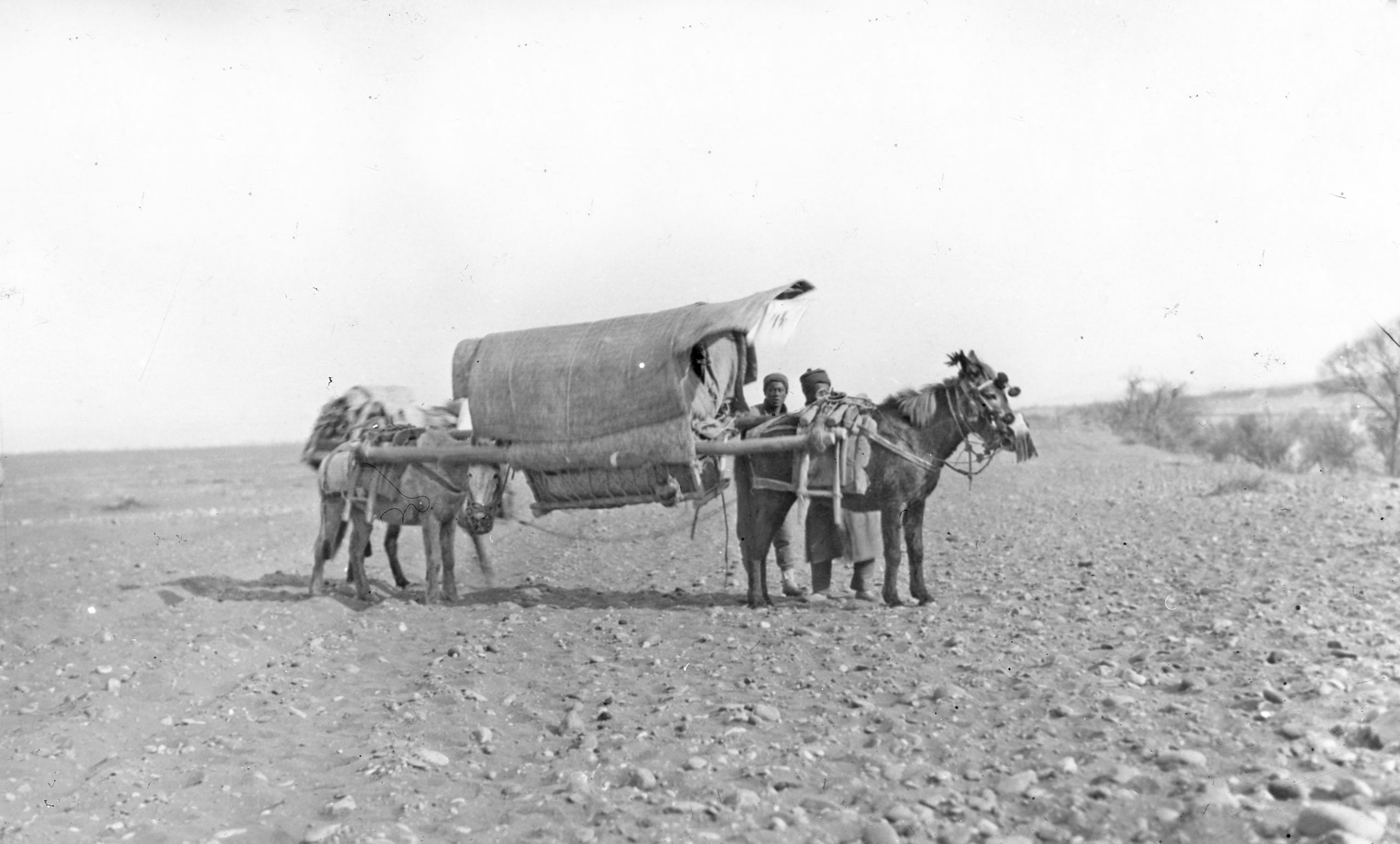
HGT's Mule litter at Wu Yieh Hsien
HGT's Mule litter at Wu Yieh Hsien
“Later.
I have sent a card to the official and two representatives have just been round. They bring very good news. A big party of soldiers - about 200, leave tomorrow for Pao T'ao by the short road and they say this means that the road will be perfectly safe. We shall have four soldiers as private escort but the others will ensure the road being free from bandits. Another instance of the Master's provision so now it ought to mean that our troubles are over going by the short route. We do not save any stages - but each stage is shorter only about 90 li instead of 120 li by the longer route. I am glad of this for we (mules and men) are all getting a bit tired but want to get through as quickly as possible. - D.V. we shall be in Peking this day week”.
Day 187 January 21st, 1924 Wu Yieh Hsien to Patsebolong - 24½ miles
They left Wu Yieh Hsien at 7 a.m. with an escort of three mounted soldiers and taking a S.E. course across the plain, passed several villages. They had a rest at noon and at 4 p.m. after passing a small village they could see a cluster of trees about 3 miles away. HGT was told that this was Patsebolong.
“I borrowed one of the soldier’s horses and told him to take his place on the back seat of the cart. Taking another soldier with me, I rode on ahead and reached Patsebolong at 4.30 p.m - just as it was getting dusk. The carts arrived at 5 p.m.”
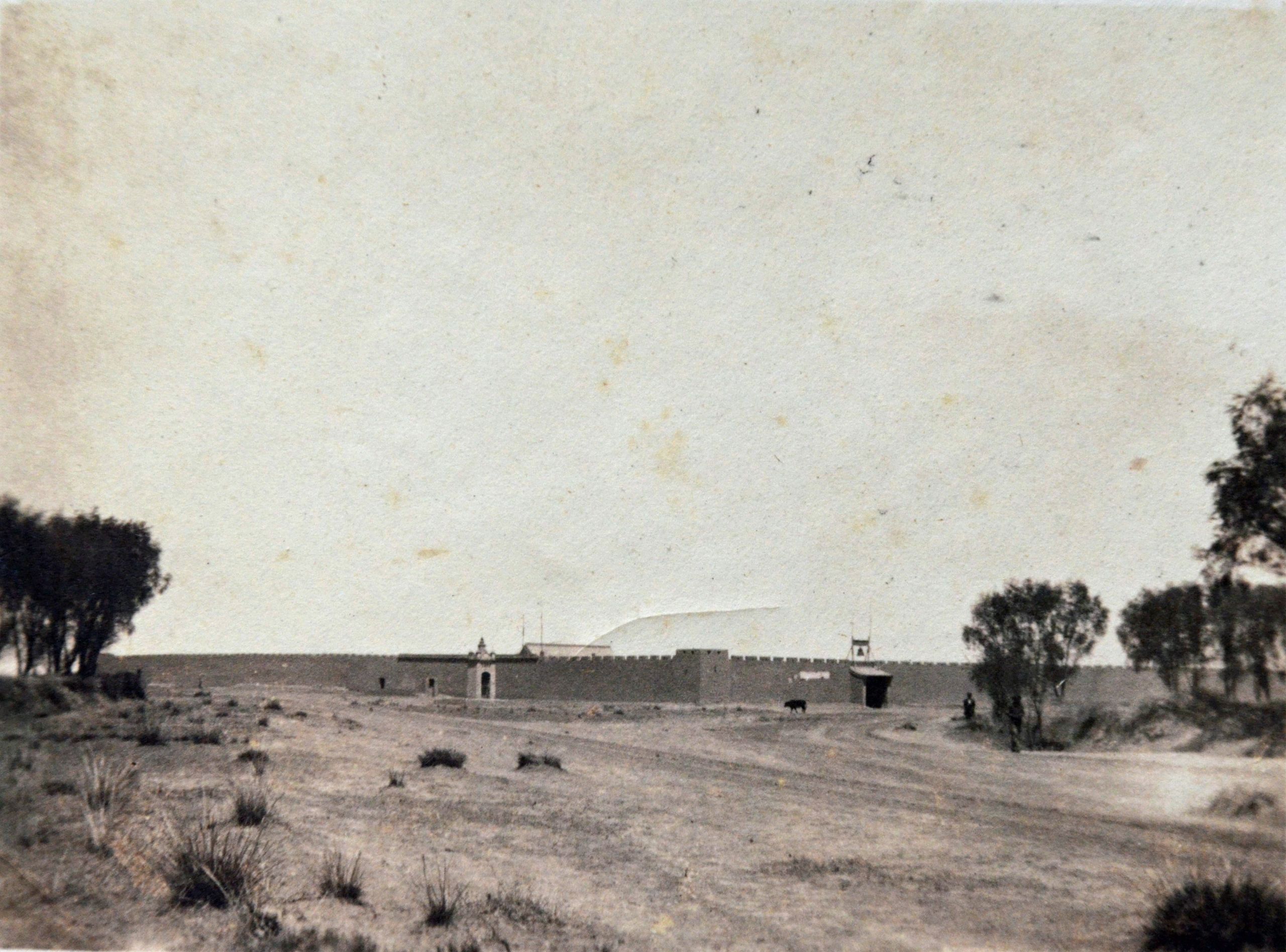
Patsebolong - Swedish Mongolian mission village - from outside the walls
Patsebolong - Swedish Mongolian mission village - from outside the walls
“Patsebolong is a very interesting place - It is the centre of a Swedish Mongolian Mission and is a walled-in Christian village. The idea was originated by a Mr. Friedstrom - who was negotiating with the Mongolian chieftains for a big piece of land when the Boxer trouble occurred and four missionaries were killed. As compensation, 6,000 acres of land were given to the Mission and later another 6,000 acres were bought - so that now there are about 12,000 acres”.
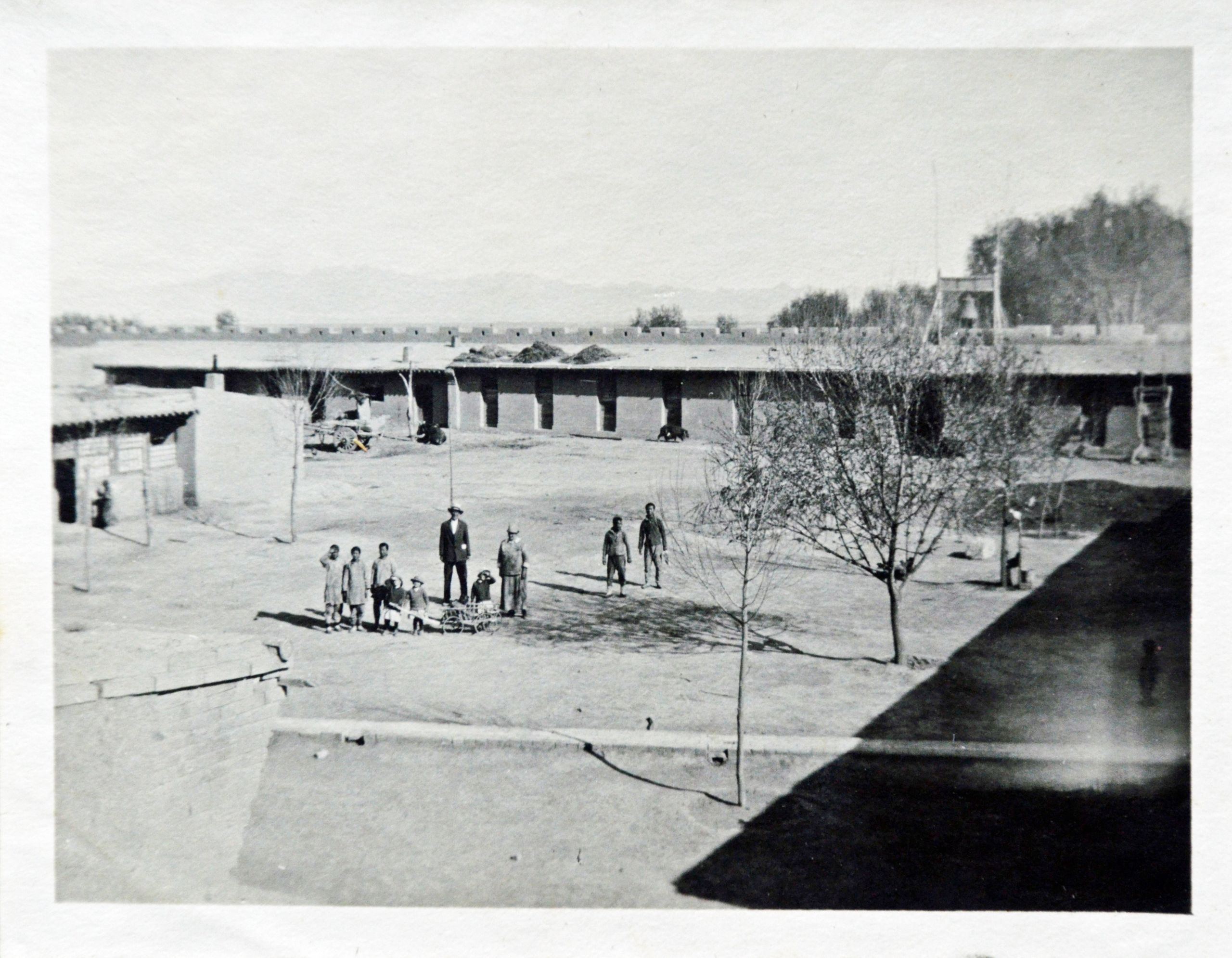
Patsebolong - Swedish Mongolian mission village - from inside the walls
Patsebolong - Swedish Mongolian mission village - from inside the walls
“Irrigation canals were cut and water thus obtained from the Yellow River, for the rainfall is very small. The idea was to get the Mongols to settle down to agriculture. In this respect it is not a success - as the Mongols prefer to live their own life - cattle raising etc. Some Chinese have taken up allotments of land and altogether there are about 1,000 people supported on the land. They built their own. homes and pay a ground rent of about $25.30 per chien of land being cultivated. The land is fertile and living very cheap. Firing (fuel) can be obtained in the form of long grass - for the trouble of fetching it. Coal costs 7-8 cash per 1 Lb.” (a chien or qîng, of land is the equivalent of 6.144 ha or 15.18 acres)
“Mr. and Mrs. Danielson have three children and are in charge as Mr. Friedstrom died last year. Mr. Bubery, Mr. Gusterson and Mr. Muelman are also in the work, the two former being Swedes, the other of Swedish descent but American nationality”.
“Numbers of trees have been planted but one difficulty is rabbits who eat the bark and kill the trees. There is plenty of shooting - wild duck, geese, pheasant, grouse, antelope etc. are plentiful in the summer and autumn”.
HGT received a hearty welcome and was put up in Mr. Muelman's quarters. Before leaving he was given some fresh bread and biscuits for the journey.
Day 188 January 22nd, 1924 Patsebolong to Ta Tse Tien - 33½ miles
They left Patsebolong at 6.40 a.m. going nearly due south to the west end of the Shi Shan - or Wu Lu Shan, then travelling almost due east, keeping near to the mountain range.
“Our escort kept making enquiries as we went along and got the information that two days ago a band of 200 robbers came across the Yellow River but yesterday were driven back by the Mongol regular soldiers - a kind of militia - so that now the road was clear to Pao T'ao. This is good as the soldiers who were to have left Wa Yien Hsien the same day as we had, were delayed a day - so are a day behind us.
They passed two Mongol lamaseries during the day called Siao Miao and Kwang Miao They are different from the Tibetan lamaseries in that they are almost entirely white and generally have two or three chortens placed close together in a row behind the lamasery.
“We had planned to stay at an inn by the Kwang Miao (lamasery) - but we heard that there was an inn 20 li further on, so we pressed on and are now staying overnight at this place (Ta Tse Tien). This is a Mongol inn with just one big long room with a k'ang on each side and a passage down the centre. There is room for about 20 guests on the big k'ang and about 8 on each of the smaller k'angs. I am fixed up with my camp bed at the extreme end of one of the smaller k'angs. The place is thick with the smoke from the fire at which the boy is cooking which makes it difficult to see to write.

HGT's sketch of the room layout
HGT's sketch of the room layout
“One night more (after tonight) and we shall (D.V,) be off the road and at Pao T'ao where the railway terminus is”.
Day 189 January 23rd, 1924 Ta Tse Tien to Hai Yerh Ho Tung - 30 miles
They left in the morning at 5.15 a.m. and went along steadily till 12 noon when the soldiers advised them to keep to a smaller road nearer to the mountain range immediately to the north. This they did and as there was no inn they decided to push right on to Ha la pu ta - a village where they hoped to spend the night.
HGT wrote the following letter home.
To
Mrs. Thompson
Yunnan fu
"D.o.g. Jan. 23
Our soldier escort are very alarmed because they have met a man who says that there are lots of tufei on the road ahead.
We are now about 7 - 8 li from Hai Yerh sa chi and have turned off the road – a few hundred yards to a little village called Hai Yerh ho tung – to decide what to do. Hai Yerh sa chi is only 10 li from Ha La Piu Ta and therefore this place is only 18 li away and the report is that the robbers are in the vicinity of Ha La Piu Ta.
------
Jan. 24 As they say General Ma was due to leave Wu Yuen Hsien the day we left or the day after, we have decided to stay here a day and see if he turns up. If so we shall continue with him - if not then at 1 p.m. we will proceed cautiously to try to get through as we cannot stay here indefinitely and, moreover, our whereabouts will soon be known to any bandits in the neighbourhood.
If we can get through, the next 50 li we ought to be all right.
Two of our soldiers have gone back along the road to see if there is any sign of General Ma. If not, then it means he has not left as expected and we cannot tell when he may turn up - if at all.
There is also a report of Tufei on the south of our road that we passed over yesterday - so it is probably as safe to push on as to attempt to go back.
This plan seems the best to follow - so we propose if there is no news of General Ma approaching by 1 p.m. to commend ourselves to God's care and push on.
Daily Light for January 23rd. has been a great help.
"The Lord is my Defence. I shall not be moved
Thou wilt keep him in perfect peace whose mind is stayed on Thee because etc."
and one is just experiencing this quiet peace.
All things work together .... for those that love God, and in a poor and feeble way one does - so we just rest on the fact that nothing can happen to anyone of his children without his permission.
This brings my dearest love to thee and our precious little ones,
Thy loving husband,
Hubert.
P.S. 10:45 a.m.
Word has just come in obtained from Mongol people passing along the road that this group of bandits have retreated across the yellow River, and so we are packing up and getting off at once”.
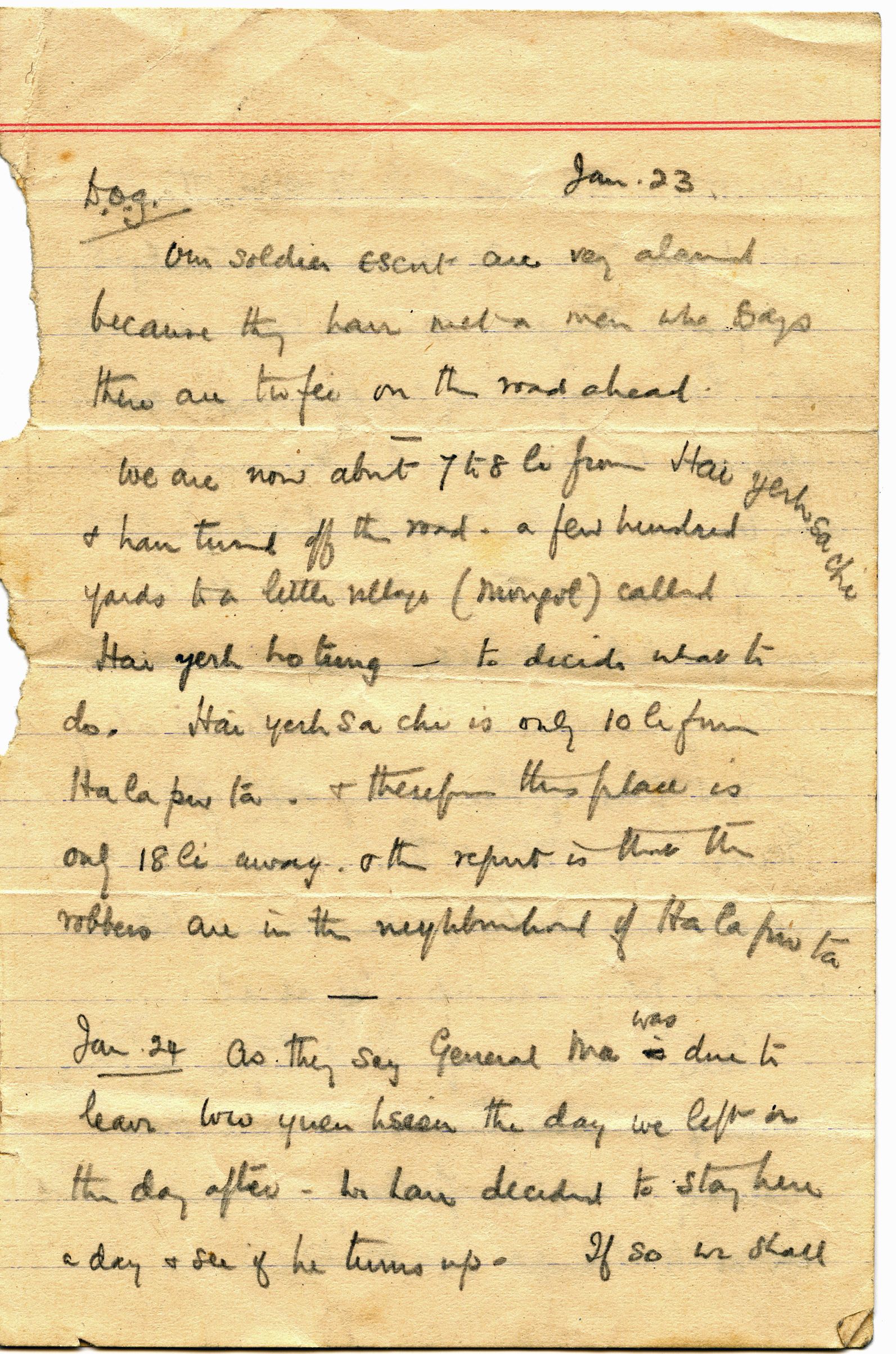
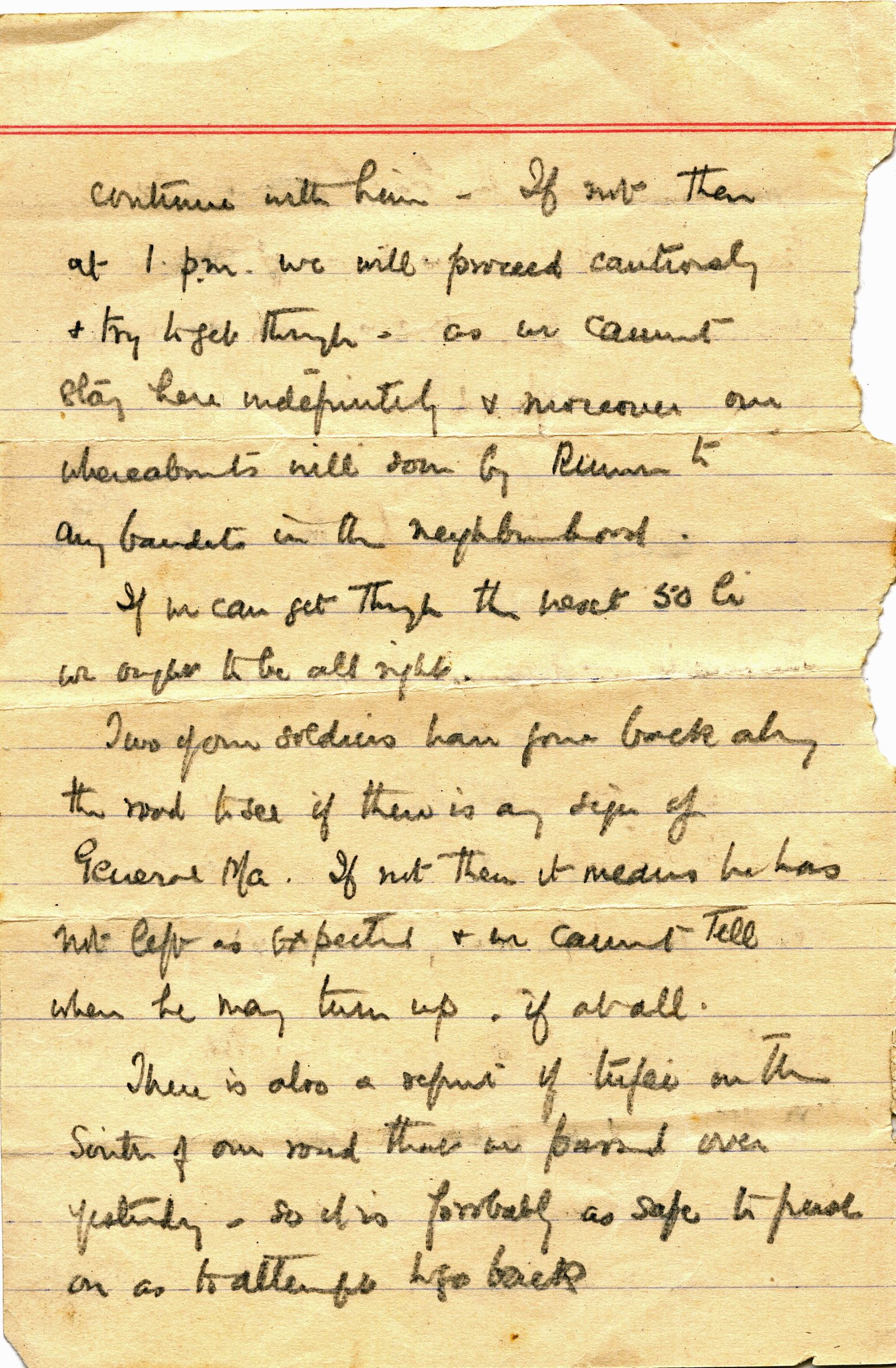
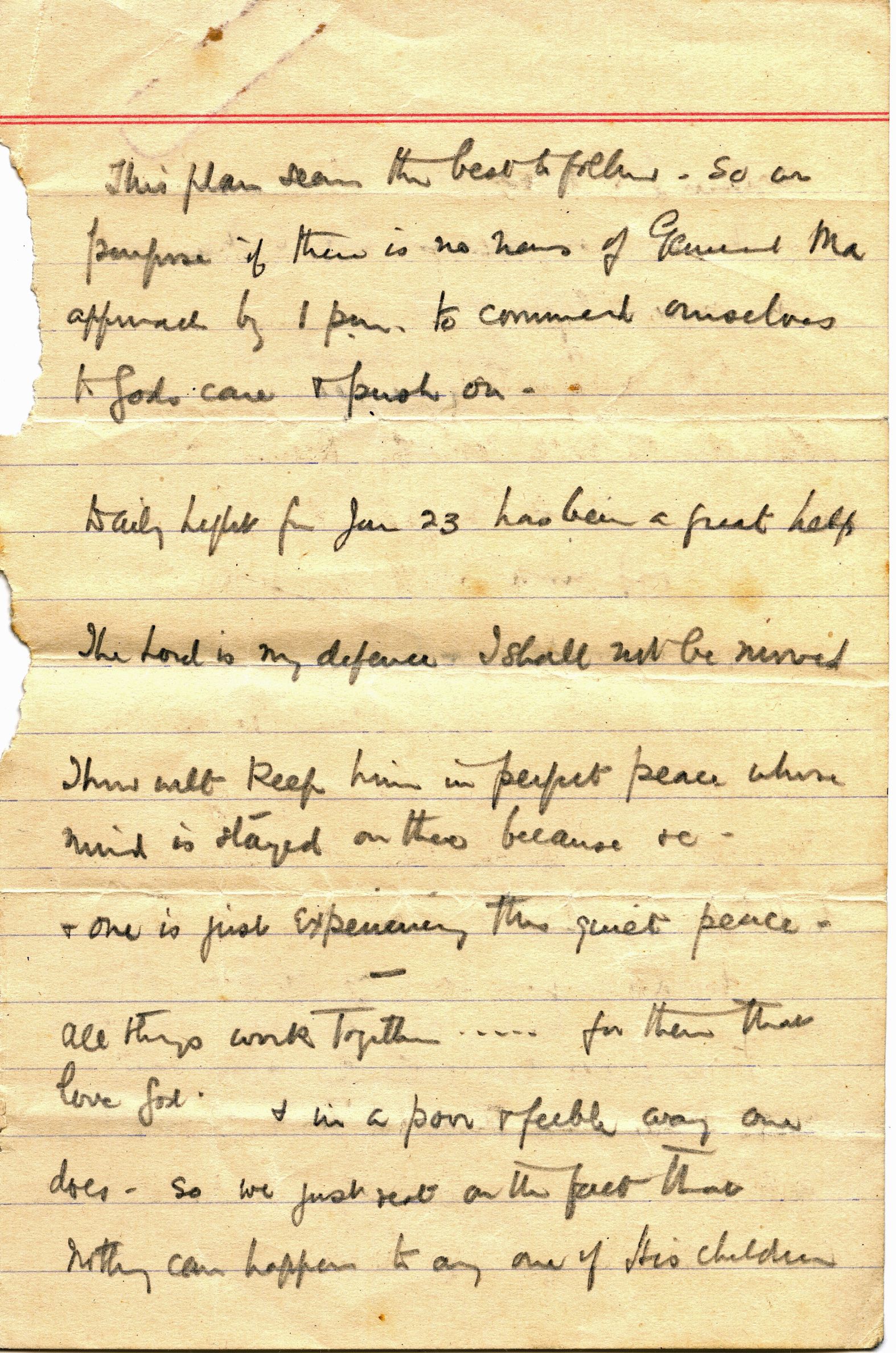
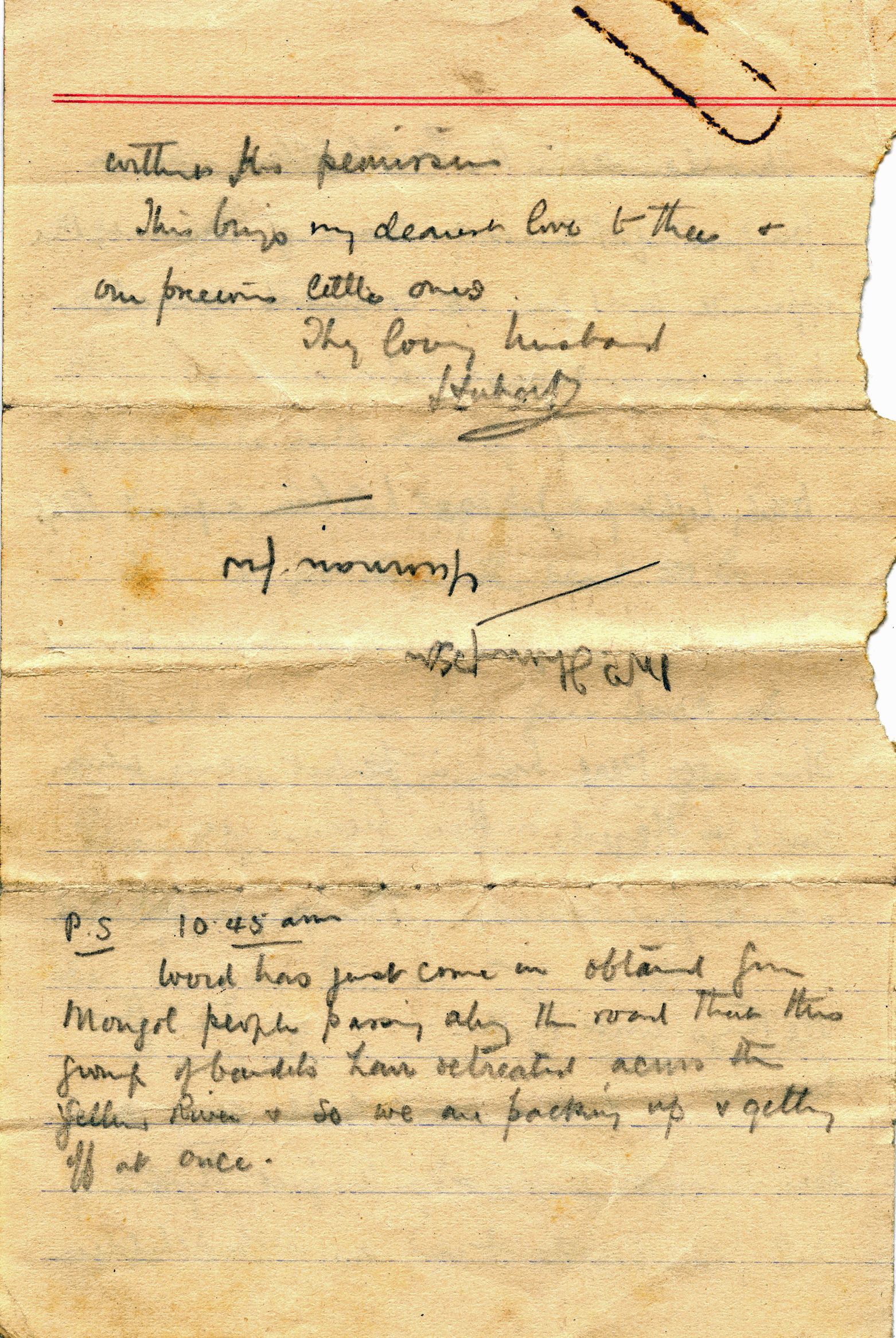
HGT also wrote the attached letter to Mr Dreyer at Pao T'ao and included a copy of his letter home with instructions for him to open if necessary.
(This 2nd letter was sent to Mr Dreyer on January 23rd, 1924 with the following instructions for him to open if necessary.)
"Dear Mr Dreyer
In case of necessity, please send the enclosed letter. I have written to my wife. It will give you details of our position. You may have heard from others that I am a CMS missionary on my way to Peking and I was with General Pereira when he died as we came through Szechwan.
If necessary, will you see the officials at Pao T’ao and asked them to do their best to see us into the city.
Yours sincerely
H Gordon Thompson
To
Mrs. Thompson
Yunnan fu
Jan: 23,
8 Li West of Hai Yerh sa chi
18 Li West of Ha Bu pei
88 Li from Pao T’ao
“My dearest one
Our soldier escort are very alarmed because they have met a man who says that there are lots of tufei on the road ahead.
It is very difficult to know if this is true or not. We have turned back about half a mile and left the big road for some cottages which are about 400 yards to the north of this road. This cottage, we are in belongs to a family called Liu – the village is called Hai Yerh ho tung.
We have talked it over with 2 or 3 other cottagers and they confirm that there are tufei on the road ahead, numbering about 40+. We were also told today that tufei were busy just south of our road and we passed them (so the escort said). It is therefore, to my mind as dangerous to return as to go on. Again, we cannot well stay here is this place may be visited any time. They told us at Lo Yien Hsien a lot of soldiers were leaving for Pao T’ao the same day as we and would take 3 days on the journey. After we had started our escort told me that they had been delayed a day – we are taking 4 days – so according to this, they ought to be here, but there is no sign of them and you know what these people are, - they may not come for a week.
We have talked things over and decided to go on by night – there is a good moon, and we have got a villager to act as guide to take us by small roads for the next 30 Li, which according to them will pass the danger spot and then we are within the range of Pao T’ao (60 li) and everything ought to be plain sailing.
This seems the best thing to do and so we are commending ourselves to God and going forward.
A few hours will see us past the danger or in the bandits’ hands.
Do not forget that nothing can happen to us without God’s permission, and therefore as we are among those who however feebly, love and try to serve Him – it must be in this - All things that work together for good.
This brings my dearest love to thee and our precious little ones.
May they and we take as our life’s motto:
Speak true
Live true
Look to Jesus, day by day
Thy loving husband
Hubert
See Daily Light for today:
“He is my defence I shall not be moved.”
Thou wilt keep him in perfect peace etc”.
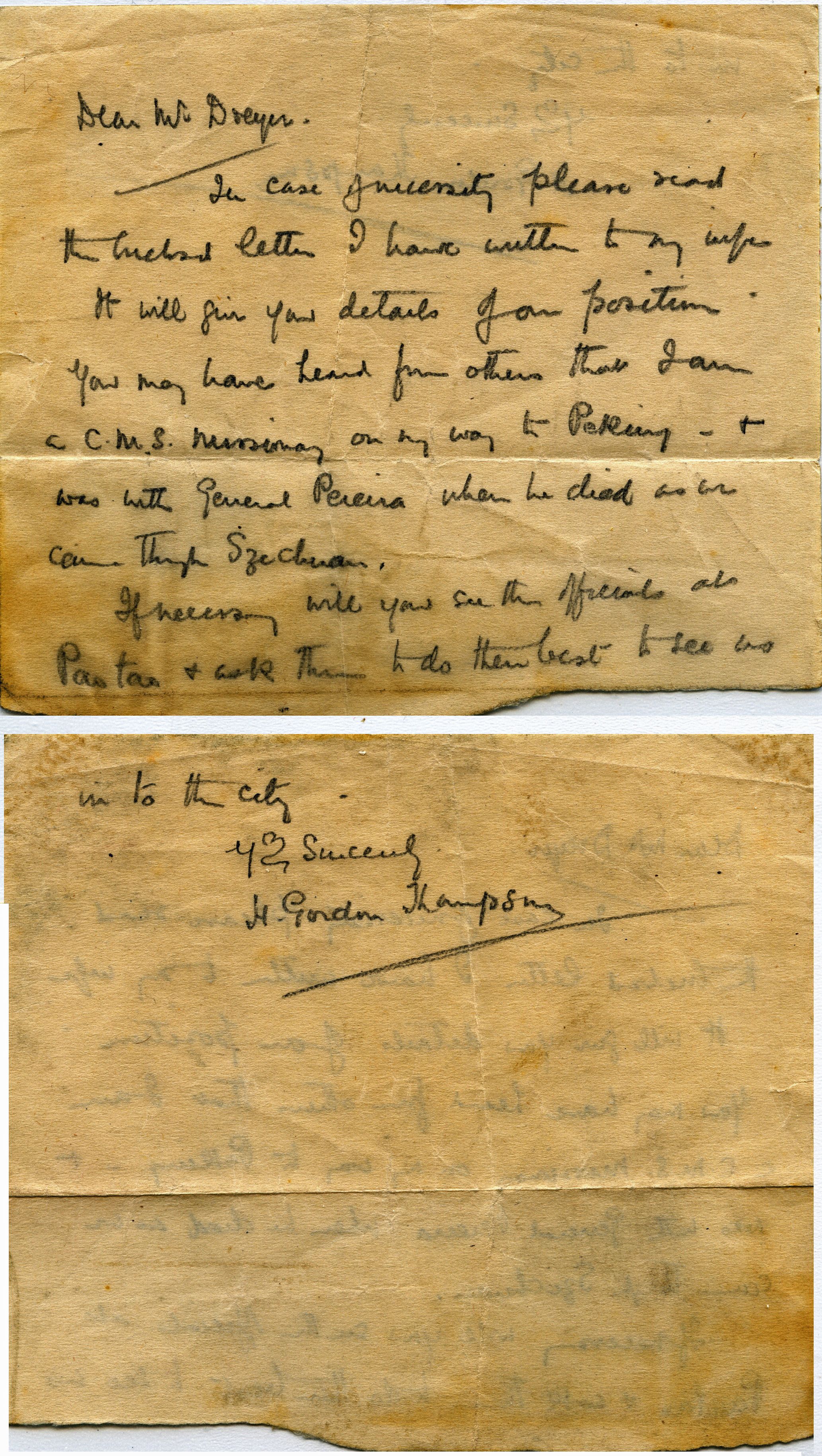
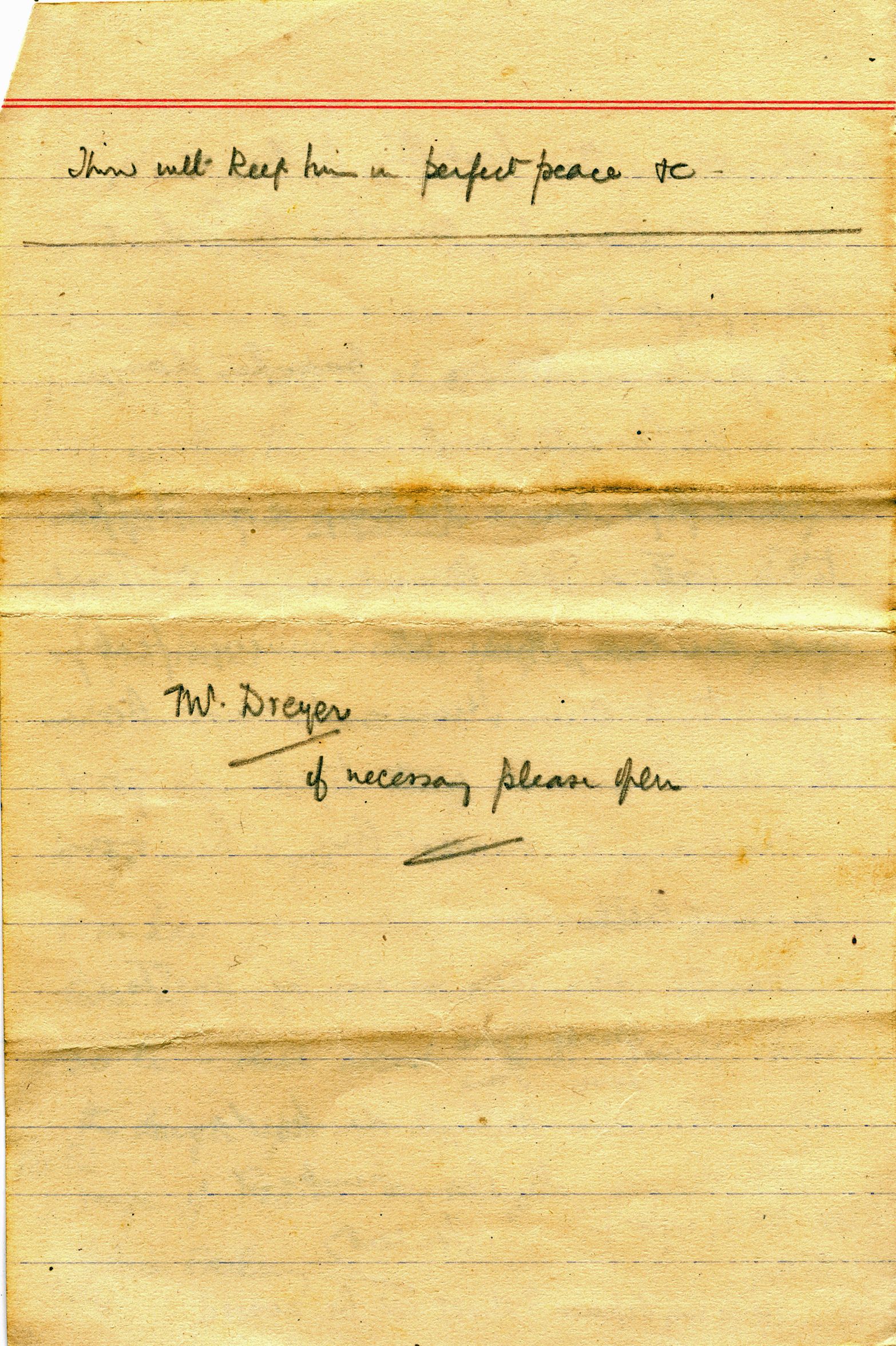
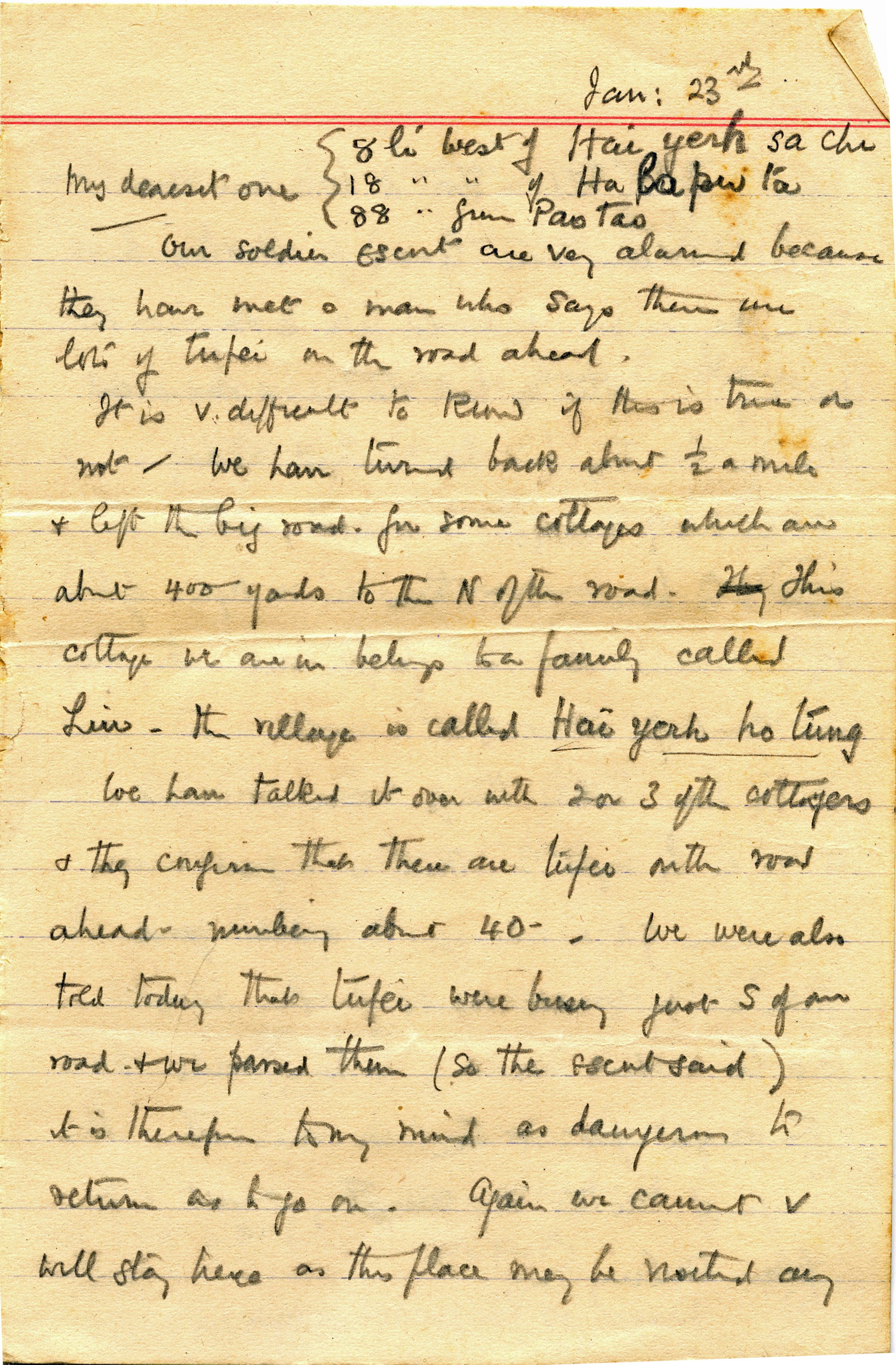
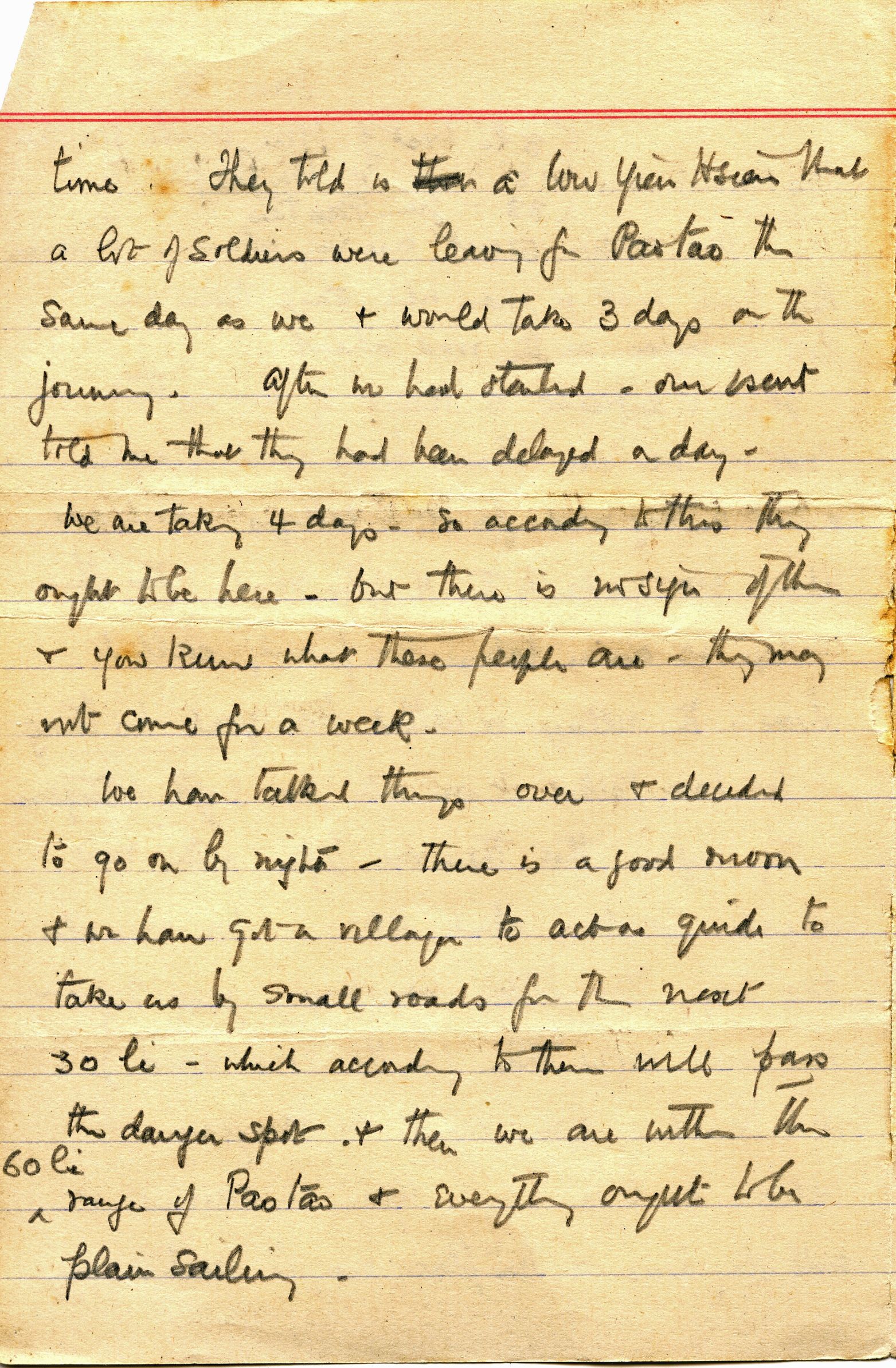
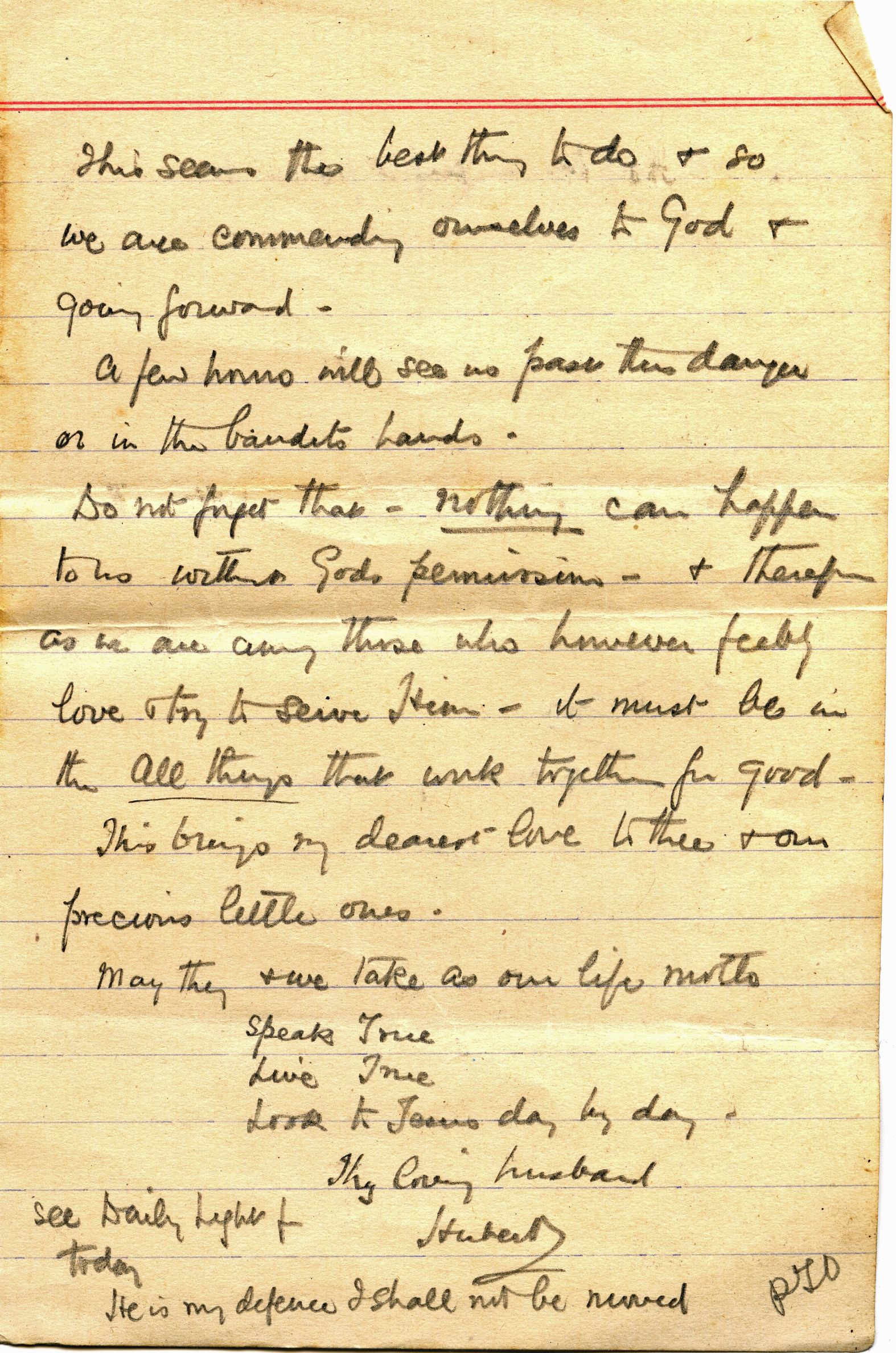
“At 12.45 the soldiers reported that there was a band of brigands at a village just 2 miles ahead, to the South of our road. We were nearly opposite but kept on, passing a good-sized lamasery called Mei li kan miao. At 3.45 p.m. when we were only 6 to 8 li from a village called Hai yerh sa chih, which was 10 li from Ha la pu ta, the escort which had gone on ahead returned. They had with them, two men who reported that there were bandits close to, if not already at, Ha la pu ta and that they had been warned to clear out of Hai yerh sa chih. The soldiers advised our returning along the road and taking refuge in the Mongol lamasery for the night. However as this was a long way off - about 20 li – and it would soon be dark, we decided to return about 3 li and take refuge in a little Mongol village with only a few huts or low houses. The village was called Hai Yerh Ho Tung.
They considered going on by moonlight as they were now only 88 li from Pao T'ao - but they were told that there were bandits on the small road and they could not get anybody to act as guide - which was necessary with carts at night going along a small road.
The final decision was to stay at called Hai Yerh Ho Tung over-night and wait till midday of Jan. 24 to see if General Ma, who was supposed to be coming from Wu Yuen Hsien with 200 - 300 soldiers, arrived. Two of their escort, went to scout and see if there was any sign of them.
“If the General arrives we will go with him to Pao T'ao. If he doesn’t show up by 1 o'clock midday we plan to travel onwards, going quietly and enquiring as we go".
“The robbers in this district are here today and gone tomorrow so it is most likely that they have already left the neighbourhood of Ha la pu ta and if we get to 35 li beyond that place we are out of the danger zone and into the Pao T'ao sphere of influence. We have unitedly committed our cause to God and hope for a good night”.
Day 190 January 24th, 1924 Hai Yerh Ho Tung
“The two soldiers have gone off as planned and now, after a good night, we are waiting to see what news they bring. They are due back at 1 p.m. If no news we must push on cautiously - feeling our way as it were. This cottage has one room about 10 feet x 12 and last night 6 of us slept here. I had my bedding unrolled on the k'ang which was nice and warn and the boy slept next to me - a big cat kept walking over us - but otherwise there was nothing to disturb our slumbers".
"The Daily Light heading for today is “The Lord is at hand” - and this has come with a new meaning - He is at hand to guide and direct, to guard and protect, and if it be His will, He can carry us through this danger without any untoward happening. In any case The Lord is at hand and I feel quite restful".
"10.45 a.m. Word has just come in, obtained from Mongol people passing along the road that this group of bandits have retreated across the Yellow River and so we are packing up and getting off at once.”
Continued - on the road to Pao T’ao
About three hours from the end of the journey, when they were within 10 miles of Pao T'ao, the terminus of the Peking - Suiyuan Railway, they were ambushed by a mixed company of about two hundred and fifty Chinese and Mongol bandits. At the time HGT was travelling in the cart and he was taken prisoner.
Fortunately, HGT was able to save all their maps and important records, by keeping them on his person. Most of the photographic records had been saved as he had posted them to Shanghai from various places en route. Everything else went; camp equipment, geographical and surgical instruments, etc. were all lost.
From this point on HGT was not able to maintain his journal though he did keep copies of the letters he sent to Mr Dreyer at Pao T’ao.
At Tung Kung Jan. 24 1924
"Dear Mr Dreyer
I am Dr Thompson from Yunnan-fu and I was on my way with General Pereira from Yunnan-fu to Peking. The general died at Kanze and I’ve been taken by a band of men who are holding the Ning Hsia road within one day of Pao T’ao.
They say they are not ordinary Tufei – but apparently are revolted soldiers.
The leader is Tsao Ju tsz and he and his men have just been talking things over with me.
They have certain terms to make and their demands are as follows – will you kindly convey them to the official.
1. They want not to be attacked, but a representative to be sent out to talk terms.
2. They will promise safe contact to whoever is sent.
I do not ask for this in my own interests, but these are their demands.
I have not been threatened so far, so do not be unduly anxious about me.
This place is about 10 Li from Ha La Piu ta and just off the road to the north nearer to the mountain – probably half a mile.
I’m not sure who is the consul in charge of this district and whether it comes under Peking, but you will know and give information.
Please convey the following message to my wife, Mrs Gordon Thompson at Yunnan-fu, which I’m writing on a separate sheet. If you think fit. You could telegraph to Aspen Palmer – military attaché, British legation, Peking – who knows that I am en-route for Peking and would understand who I am – if you say Dr Gordon Thompson.
I have my boy with me – so that is a comfort and one also with me who cannot be separated from me. Today’s Daily Light says “The Lord is nigh and whatever happens this is true”.
I cannot sign this here as I want to write a separate sheet to my wife."
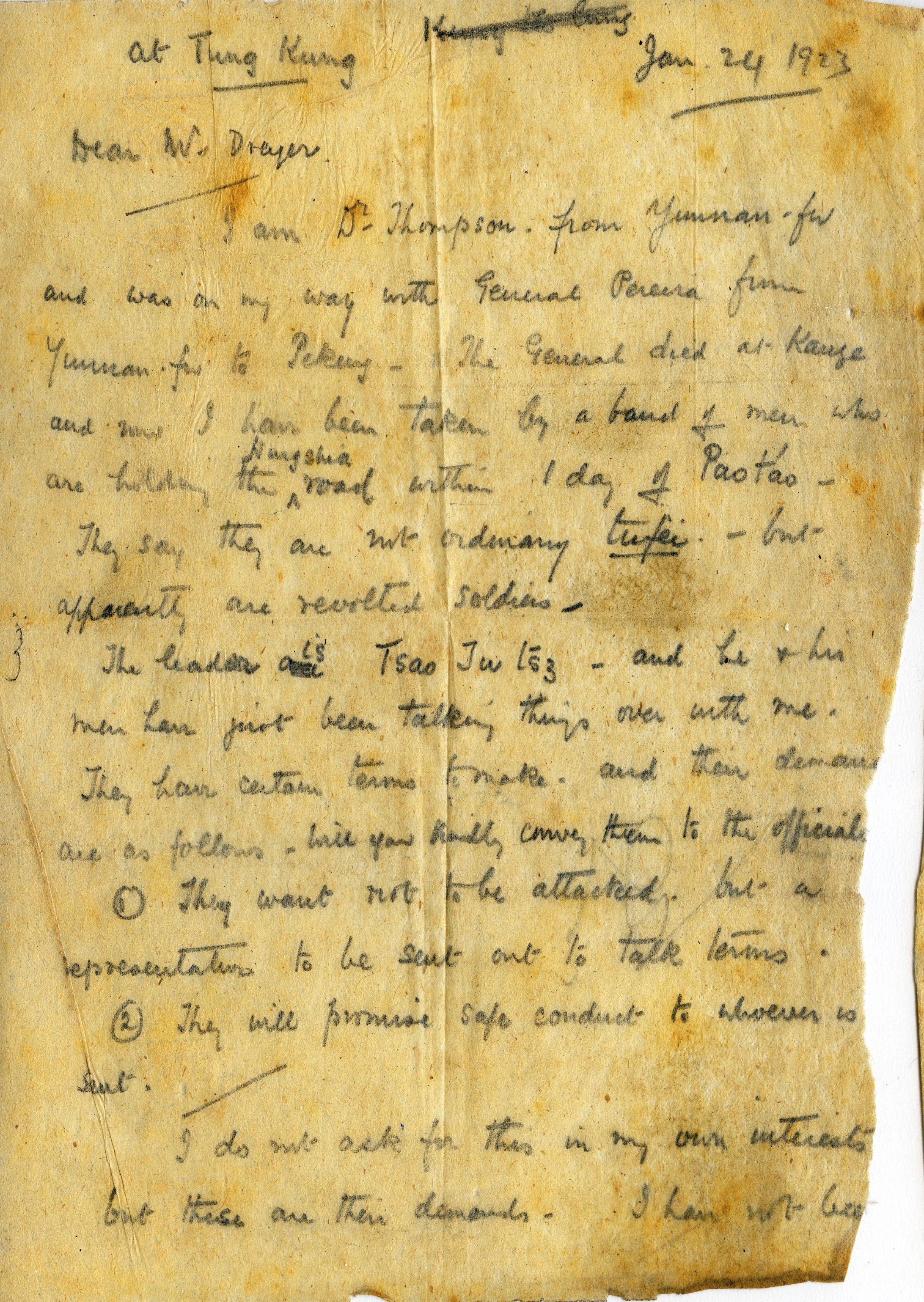
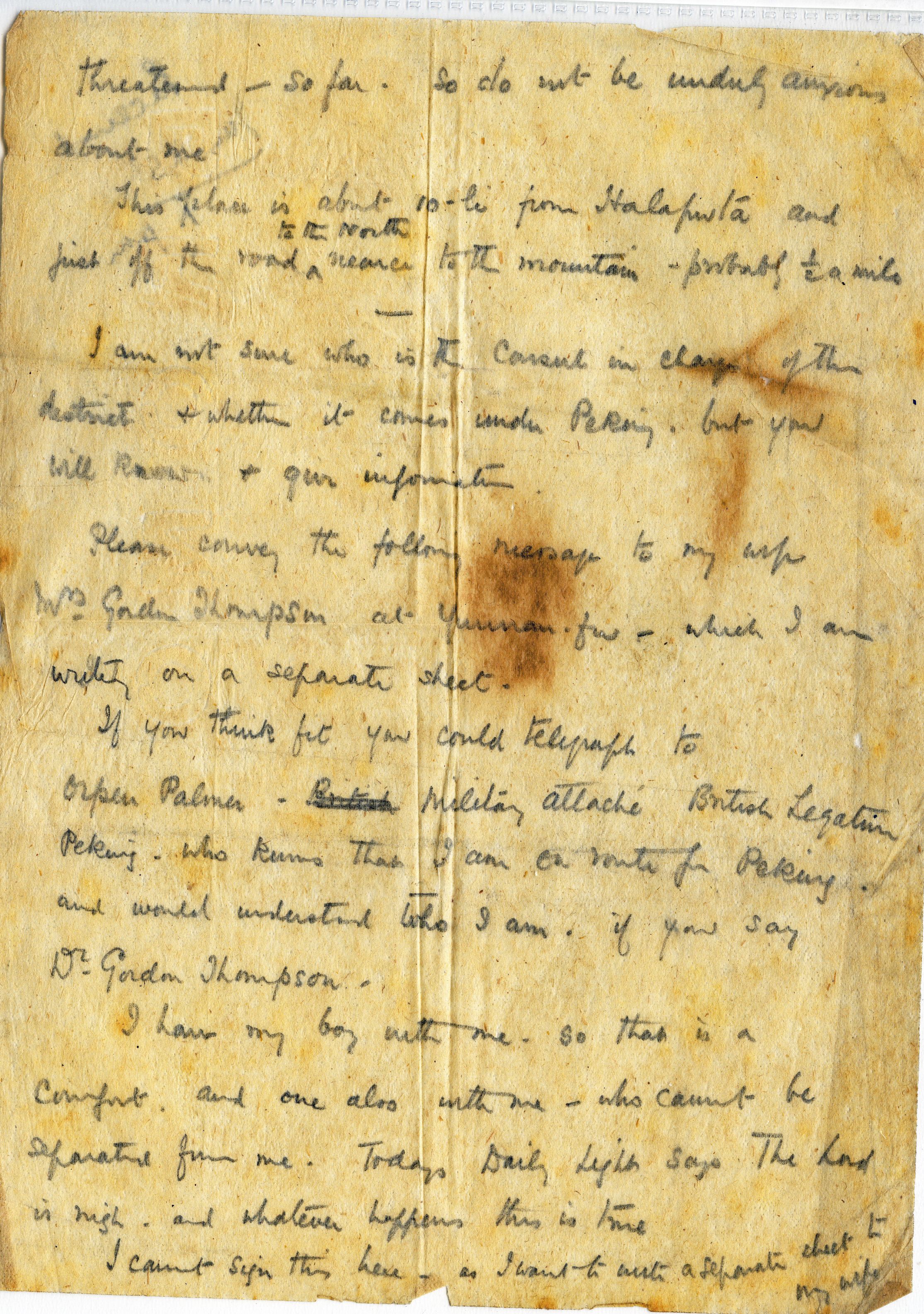
Taken Captive
For the next 6 days from 24th January to 30th of January 1924 HGT was held captive
The capture happened just three hours from the anticipated end of the journey, when they were within 10 miles of Paotow, the terminus of the Peking-Suiyuan Railway. They were ambushed by a mixed company of about two hundred and fifty Chinese and Mongol bandits. At the time HGT was travelling in a cart.
Fortunately, HGT was able to save all their maps and important records, by keeping them on his person. Most of the photographic records had been saved as he had posted them to Shanghai from various places en route. Everything else went; camp equipment, geographical and surgical instruments, etc. were all lost.
From this point on HGT was not able to maintain his journal though he did keep copies of the letters he sent to Mr Dreyer at Pao T’ao. The following description of what happened is taken from a verbal account he gave of his capture.
“There were two things which made the experience most uncomfortable: firstly, the intense cold, the temperature being 20 degrees below zero; and, secondly, the constant moving about. We would arrive at a place, and I as a prisoner would be thrust into a farmhouse or some building and sentries placed outside the door and on the flat roof. We would not know how long we were to stay; sometimes it would be only a few minutes, sometimes a few hours. Occasionally we travelled all night, whilst sometimes, by changing horses, we travelled all day and all night, so that when we stopped one would not know whether to settle down and try and get sleep or whether it was not worthwhile because we might be moving on again almost at once”.
“The great difficulty when the brigands took me prisoner was to get and keep in touch with the outside world. Nobody knew by which route I was making for Peking”.
Ransom demand
HGT’s captors demanded $10.000, 150 rifles, 50 automatic pistols, 4 machine-guns, and a whole district to control!
“I managed afterwards to get the paper on which these demands were written, and I brought it home with me and presented it to my wife, saying, "There, my dear, that's the value of your husband."
Days 191-194 25th – 28th of January 1924 Somewhere around the yellow river in the Ordos area of Inner Mongolia.
Making contact with the outside
HGT decided to go on a kind of "hunger strike", and when the bandits came and offered him Chinese food, he shook my head and said,
"I am a foreigner. You Chinese eat Chinese food. We foreigners eat foreign food. I must have foreign food. If you don't want me to die, the best thing you can do is to let me send a letter into the town” (three hours' journey away) and ask for food."
“They kept me waiting all night, and then they consented”.
Having first ascertained that none of the brigands understood English, HGT gave the Chinese boy, (the only one of the company left), a letter to take into the town. The letters were addressed to Mr Dreyer at Pao T’ao.
“The boy was to take the letter to the nearest town, and as he was leaving, I whispered to him not to come back, because I thought that if I got the chance to escape, I would not like to leave the boy in the brigands’ hands”.
“In the letter, after asking for some food, I described who I was and how I came to be taken. I requested that Peking should be informed, and after giving as exactly as possible our position, urged the Chinese authorities to attack the robbers and look out for me if I attempted to escape.
The following letters were sent by HGT to Mr Dreyer at Pao T’ao
Foreign 27th of January 1924
Chinese 22nd / X11 /
Dear Mr. Dreyer
I am afraid that I cannot stand the racket of this for long. We had a night journey last night – the cart going at a gallop across country tracks etc.
They say we are at a place called Hodebolo, 50 Li from Pao T’ao. We are South of the river and are going East – they say, 50 Li today and they say we shall tonight be 20 Li from Pao T’ao – but I think we shall be much more – ask the bearer how quickly he can return and you will know.
Please asked General Ma to try and quickly come to terms or he will have a dead man.
At present, all I can find out is that they want some guns and ammunition, but I am to have an interview this morning with 2 leaders – Chao and So who have not yet arrived here, but are due in this morning.
Please reward the bearer with 2 or 3 dollars and see if you can arrange with him to keep me supplied every few days with food.
If you can send me a sketch map of the district for a range of 100 miles from Pao T’ao – it must be secreted in bread or a tin of something. Also, a small pocket compass in some bread or something.
Please send some bread, Lipton’s tea, sugar, tinned milk and Bovril if you can get it.
In future, if you find in my letters, a cipher – I will put a mark under the letters and you can spell it out. For instance, the word s l e p t means s e t. The word c o u n t spells cut.
I hope you understand.
I asked for a good-sized pillow or cushion and a spare pair of knitted socks – I take 7s in boots, so you can guess the size of my foot from this.
I’m afraid I cannot easily communicate with you as they watch me constantly and I fear escape is a very difficult proposition. So, will you please asked General Ma to ask their terms – unless he feels that he can deal with the matter otherwise in about a fortnight – I think I can last out a week or 10 days.
Many thanks. Yours H. G. T.
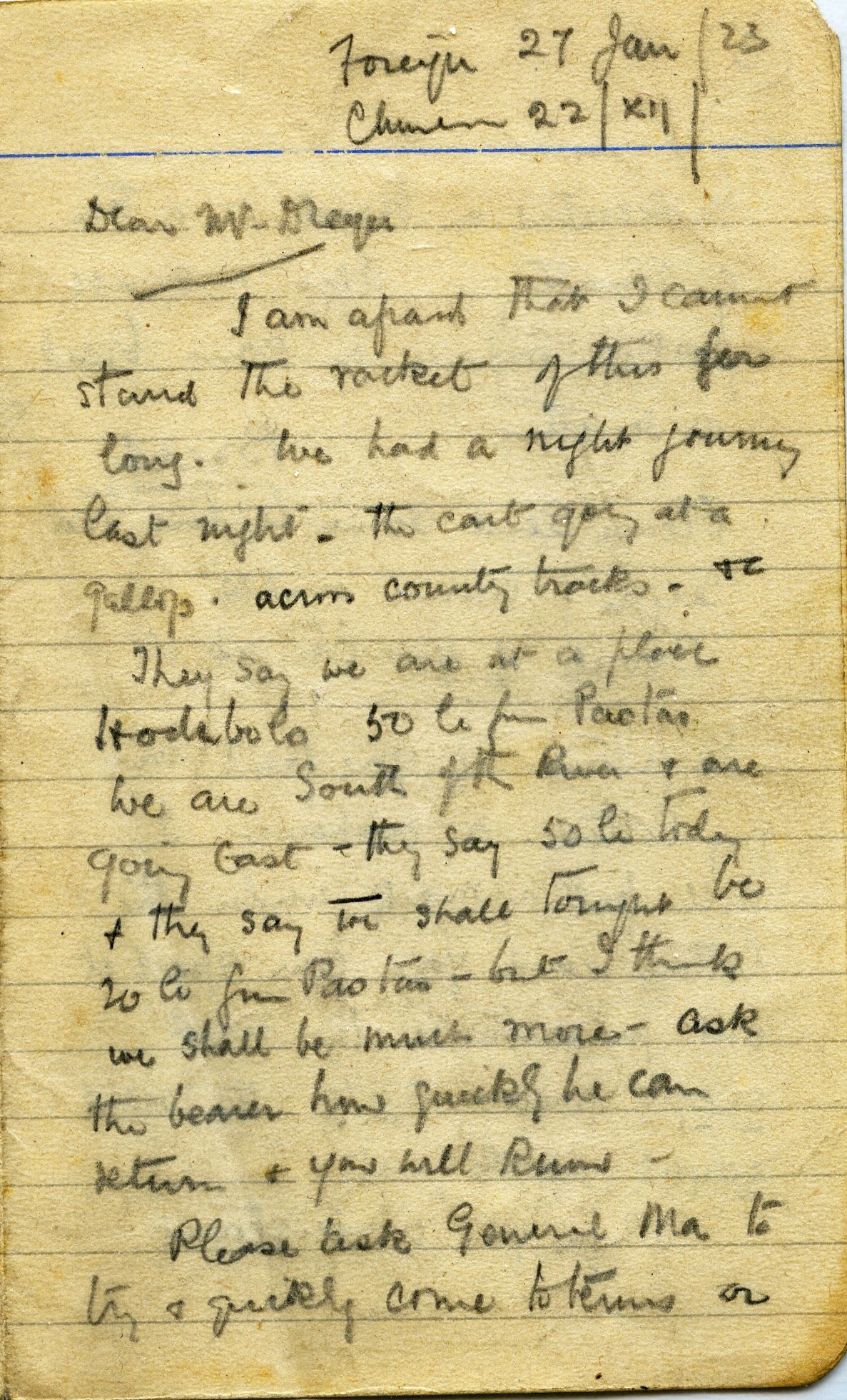
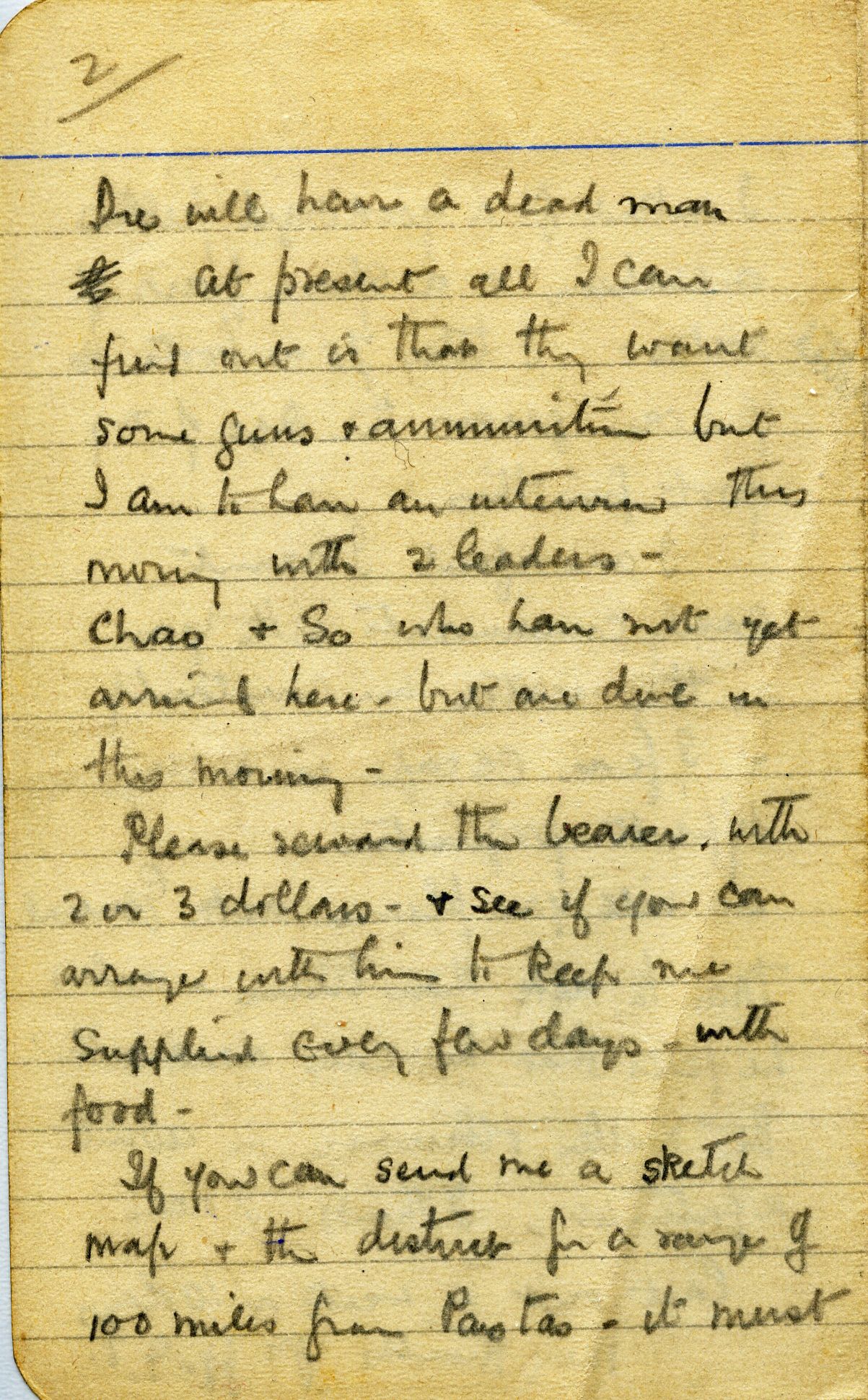
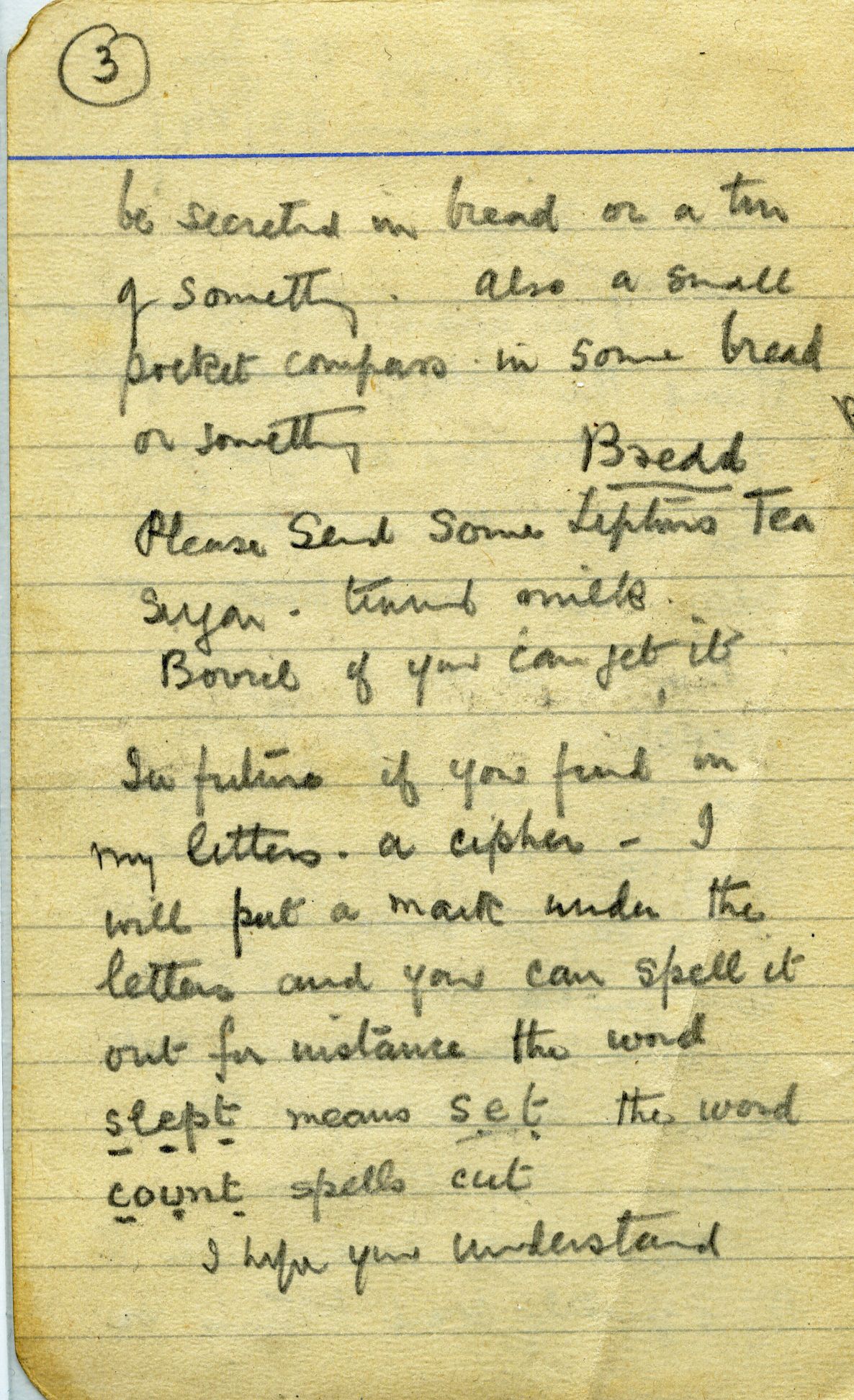
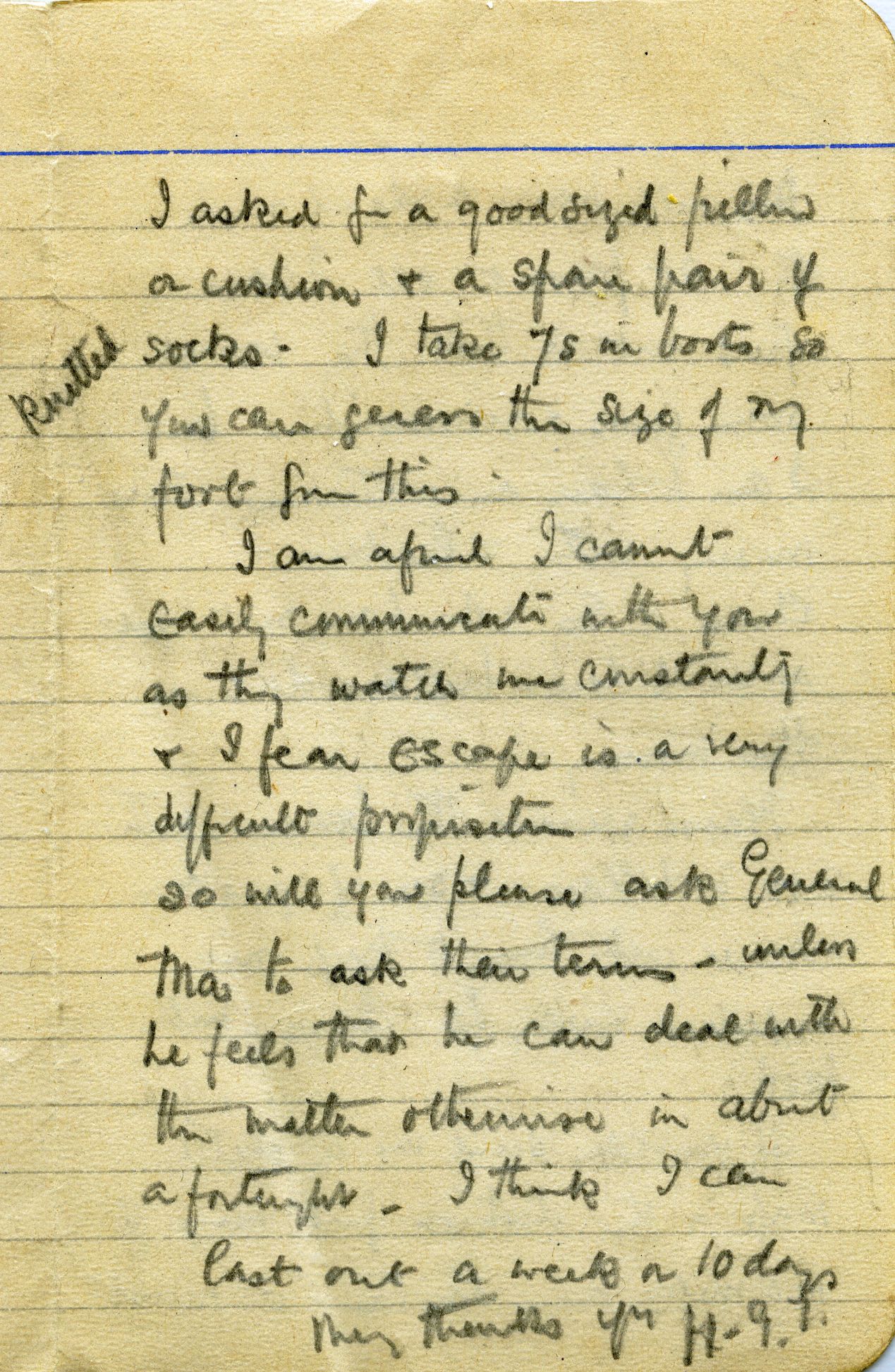
Dear Mr. Dreyer
I hope you received my letter. Will you please send by the bearer of this:-
3 loaves of bread - 3lbs
a couple of tins of jam
one or 2 tins of stew if possible meat.
If you can spare them
Butter, milk,
a big soft pillow or cushion
I’ve not heard from you so will you please put a few lines well inside the pillow.
Don’t send too much for this is my only way of communication.
I am on hunger strike for foreign food and when I finish this I will begin again – don’t be alarmed – I’m not starving.
A few notes for the military.
I am with a band of about 70 to 100 and there is only one thing and that is for them to press the attack - and look out for me if I attempt to reach them. They must keep on attacking.
I am insisting on keeping to my cart which has a white cover and a cream-coloured mule in front and a brown one in the shafts. So, as far as I can see we cannot go anywhere that the cart cannot travel. This is all I can tell you just now.
Please also send me
a small wash basin;
soap;
towel;
a pair of socks;
a spare singlet, cotton or Airtex;
I can’t stand wool next to my skin.
also a spare shirt.
I will look out for a letter from you in anything you send such as bread, etc .
Please let my wife now I am well and being treated quite considerately in a simple way – so my dear love to her and the children – with John 14 v 1
Yours
H Gordon Thompson
Private – don’t let the messenger know anything of the contents of this letter.
I’m glad the boy has reached safety. I will let you know if I get in desperate straits. I must have someone to cook for me. They are all urging me here to get the boy back – but if he comes, I shall have difficulty in trying to escape
We have left our 1st place and are now about 25 to 30 Li further to the south west. Please ask them to follow us up if ever we cross the yellow River, and if they can wire to Wai Yuen Shien they can get the crowd.
Please also send me 20 to 30 tablets of ...... and a small bottle of castor oil – in case of need.
Latest. The boy could come if he is not afraid of being left if I attempt to escape.
PS Don’t tell the boy. I don’t want him as he will surely tell the messengers that I have written that. Simply tell him not to come at present.
If you can get someone at Pao T’ao to come every few days with bread for me it will be a means of communication
Please send me a small english bible.
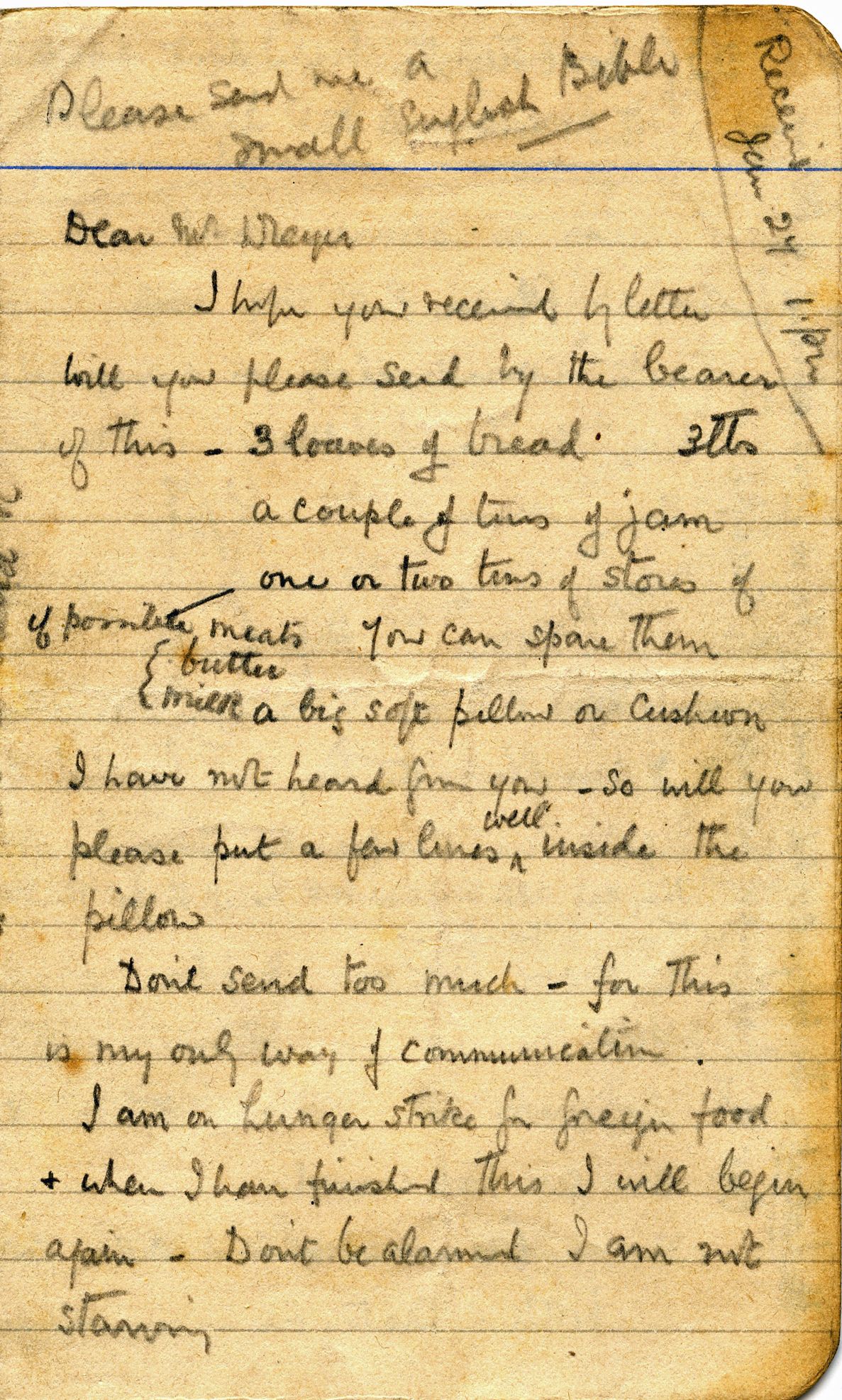
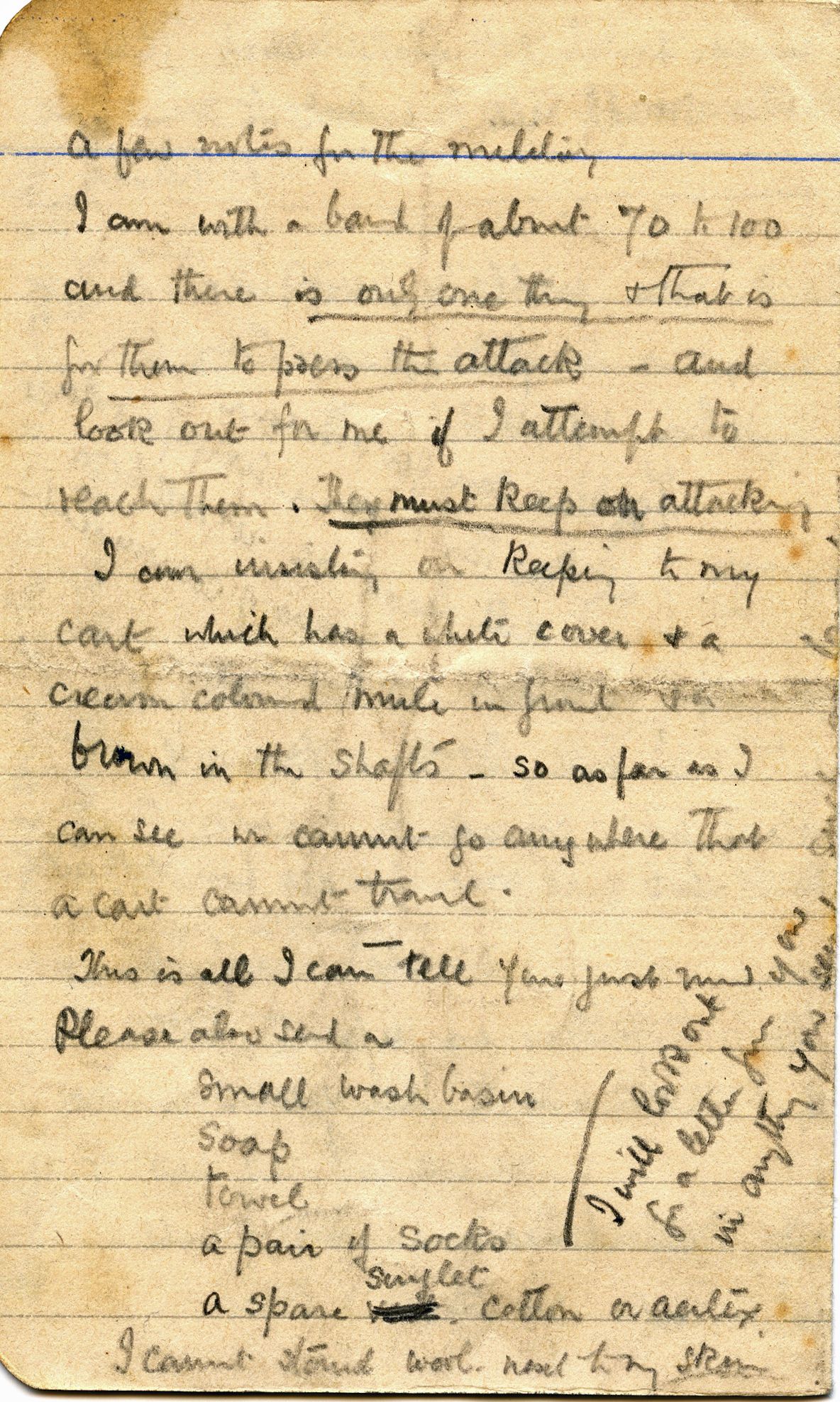
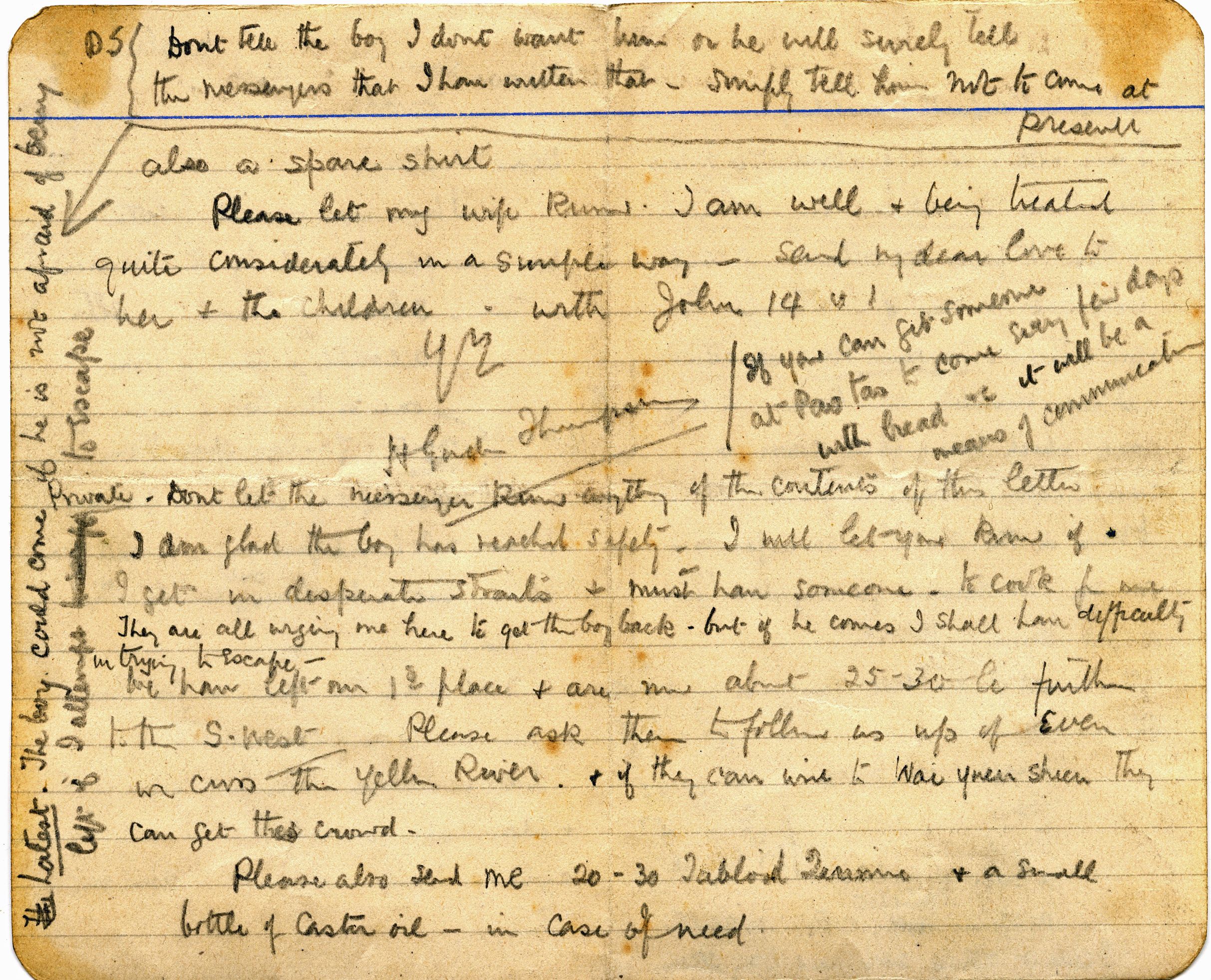
Dear Mr Thompson
I am very sorry for that you are taken by robbers. Every day I request God to help you in safety. Governor Ma and I have sent many men to the robbers to terms. And we do as best as we can and hope you free as soon as we can. Please do not be afraid of the three men I sent had arrived the robbers place.
Now I am sending ytou a few things.
- Milk
- socks
- tea
- sketch
- an old compass
and a letter from Mr Dreier which are brought to Mr Kun who comes also to term with robbers. I think you can hear the result from him.
Hoping you well
Yours sincerely
Col. S. Y Chao
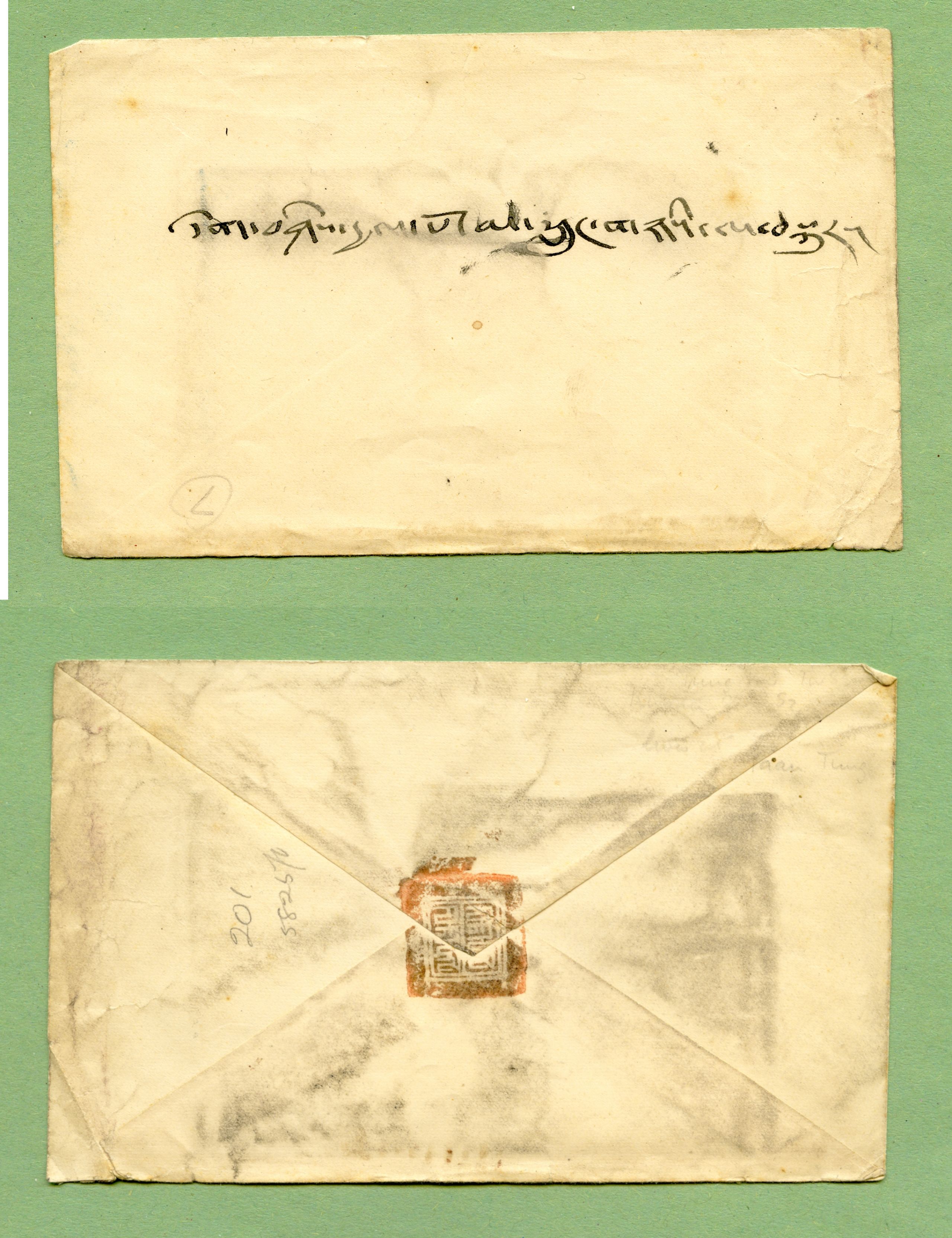
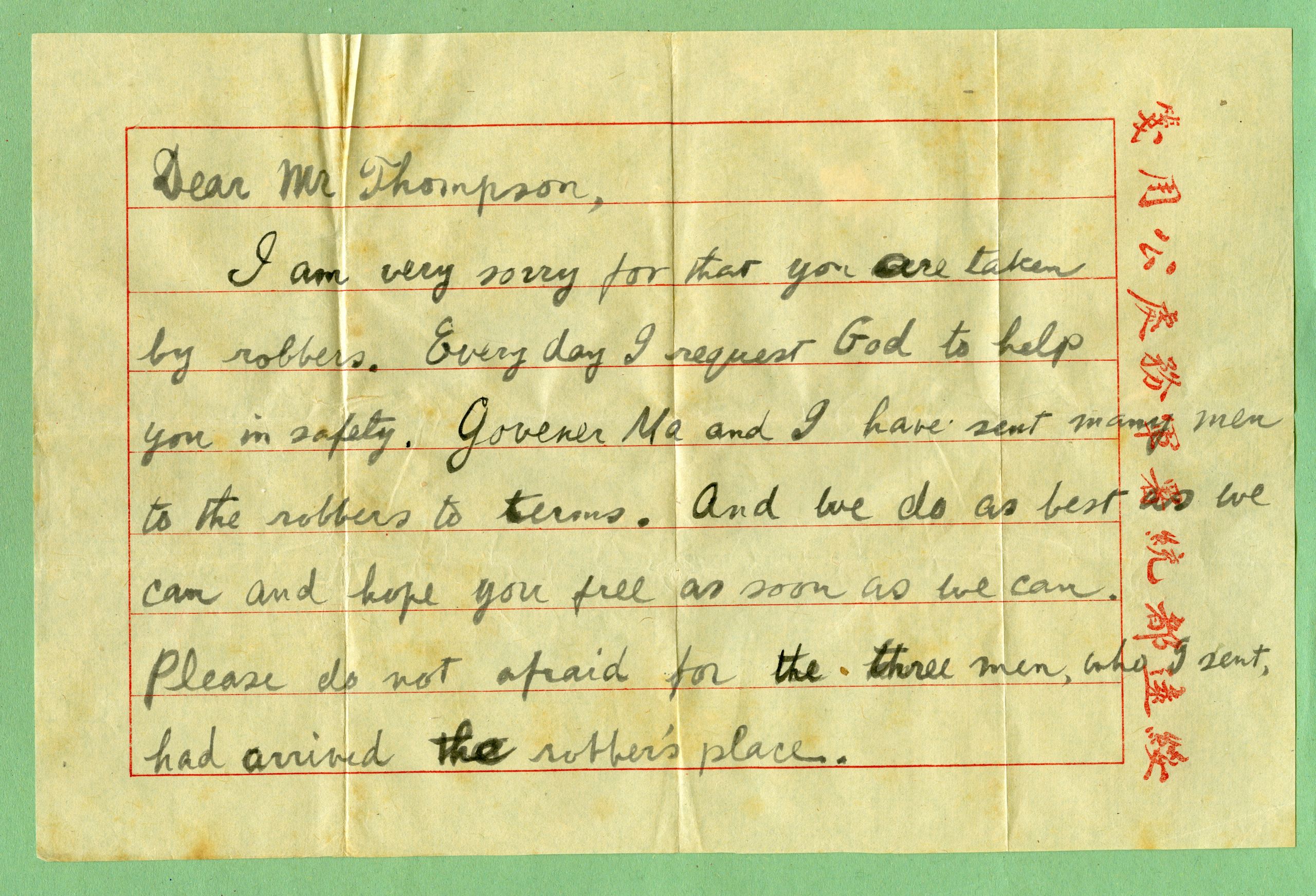
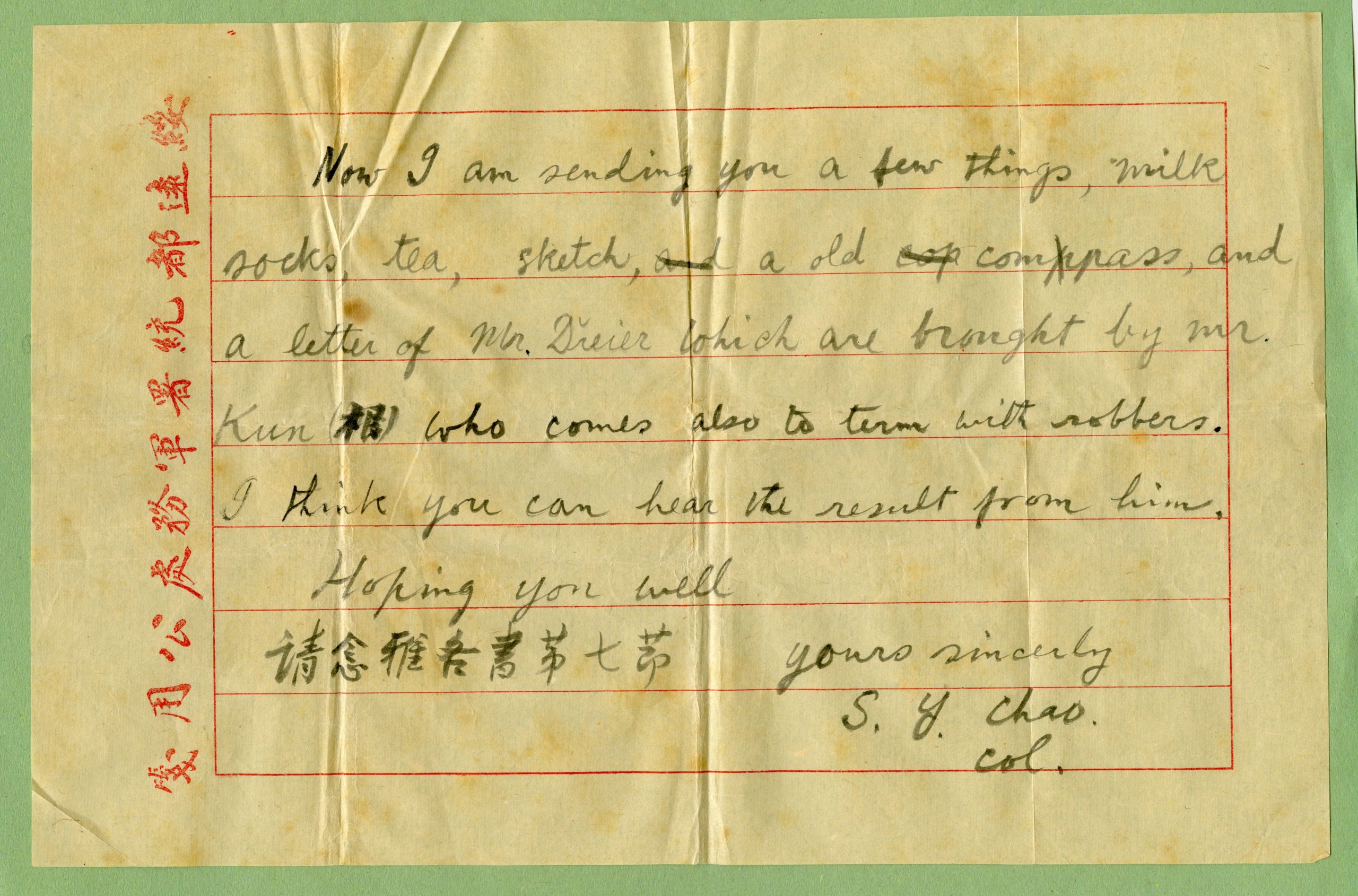
Each day HGT requested that a messenger be sent to ask for food, and, strange to say, as with the Chinese boy, several messengers whom the bandits themselves sent out did not return. Thus. HGT was able to keep the authorities informed of their movements, while to the bandits he pretended to be getting weaker and urged them to open negotiations.
Finding food and staying alive
Having started the pretence and refusing food, HGT had to keep up the appearance.
“I managed to subsist on scraps picked up unknown to my captors. We came to one farmhouse, and when I went into the courtyard. and stumbled over what I thought was a pile of stones, I found they were actually frozen potatoes. I pocketed about six and went to the room in which I had been put as prisoner here was a pan of tea boiling on the fire, and when the brigands were not looking, I dropped the six potatoes into the boiling tea. About a quarter of an hour afterwards I managed, when again they were not looking, to get those potatoes out, and then went and lay down. I covered my head up as if going to sleep, and made my supper of boiled potatoes!”
They reached one farmhouse, and his captors, getting rather desperate at his apparently weak condition, asked him whether he liked pigeon. HGT replied, "Yes, if it is cooked in foreign style". Thereupon they told HGT’s cart-driver to see what he could do. He plucked the pigeon, chopped it up and put it with potatoes and vegetables into the pan on the fire, and there was very soon a most delicious smell of pigeon stew.
“I rather longed for some of that stew, so I asked if he had put any salt in it. When he said he had not, I told him to go and see if he could get any. The brigands were out of the room, and whilst the carter was also away, I seized a handful of the stew and put it into my pocket. When he had put the salt in, I suggested some sugar might improve it, and whilst he was getting that I pocketed another handful of stew. A quarter of an hour later he said it was ready, but after tasting it, I refused to have any more, saying, "You don't know how to cook European food; you had better put it down." He did so, and went out. I could not resist that stew, for I was really getting very hungry, and having disposed of it I put the bowl on the floor. The usual Chinese dog came in and sniffed round, and when the carter returned the dog was eating up the bones. I said, "Anyhow, the dog likes it." I heard the carter go to the brigands and say that he certainly could not prepare European food properly, for I had given the stew to the dog. He did not know I had had a very good supper”.
Help arrives
“My letters had been received, and first a catholic priest came to the bandit camp. He had been promised safe conduct by the brigands if he would bring me food. He tried to negotiate, but he had to leave because another Catholic priest was in captivity only 8 miles away. That poor man had had an awful time. He was a captive for about eight weeks, and when eventually they got him away, he only lived two months, dying as the result of his experiences”.
“Then the Chinese sent an agent over, and he tried to bargain with the bandits for my release”.
The Government agent also found that he could not make any impression on the captors, and that it was impossible to argue with them or beat them down. He told HGT that he had to leave as he could not come to terms, and he expected to be on the move once again.
Day 195 29th January 1924
Escape to safety
“That night, at half-past nine, I was expecting the guards to come in and say they were off on the move, instead of which two crept in and said they were going to help me to get away. I was somewhat suspicious, because I saw behind them the Government agent, whom the Catholic priest had warned me was really a bandit. Therefore, at first, I refused to go. They went out and talked it over and got very excited outside. Finally, they came in with a rush and got hold of me, and there was no question whether I would go or not. One man held me by the wrist, and with his revolver in the other hand we started out and went, in the darkness of the night, over the frozen country for 2 miles until we came to a farmhouse”.
“They knocked, and we went in. Inside, the farmhouse was very brilliantly lighted. There I found the rest of my guards and once again the Government agent. Ponies were soon ready, and we trekked away to the north, crossed the Yellow River on the ice, which was about 3 feet thick, reached a village at 3 o'clock, rested until daylight, and then mounted our ponies again, striking north as fast as we could go”.
Day 196 30th January 1924
Safety at Ta Noor
about 40 Li South of Pao T’ao
“Finally, at nine o'clock 9 (am) we reached a village where there were 250 troops waiting to take us into safety. When we reached the town, I was received by the son of the Governor and the chief of the staff, who had planned how they would help me. The latter was a Christian man, and he took me aside into a little room, where he knelt down and thanked God for my escape. It was a most touching experience”.
"When I could find words, I said to him, "It is an extraordinary thing that you have done. Why did you send a man who was a bandit to try and help me to get away? "His reply made everything quite clear. He said, “Nobody but a bandit would dare to go into the bandit camp. We had to employ a bandit for the purpose, and his instructions were that when he got in touch with the bandits, he should bargain with them, and if they would not come down in their terms, then he was to give some money to the guards and ask them to help”.
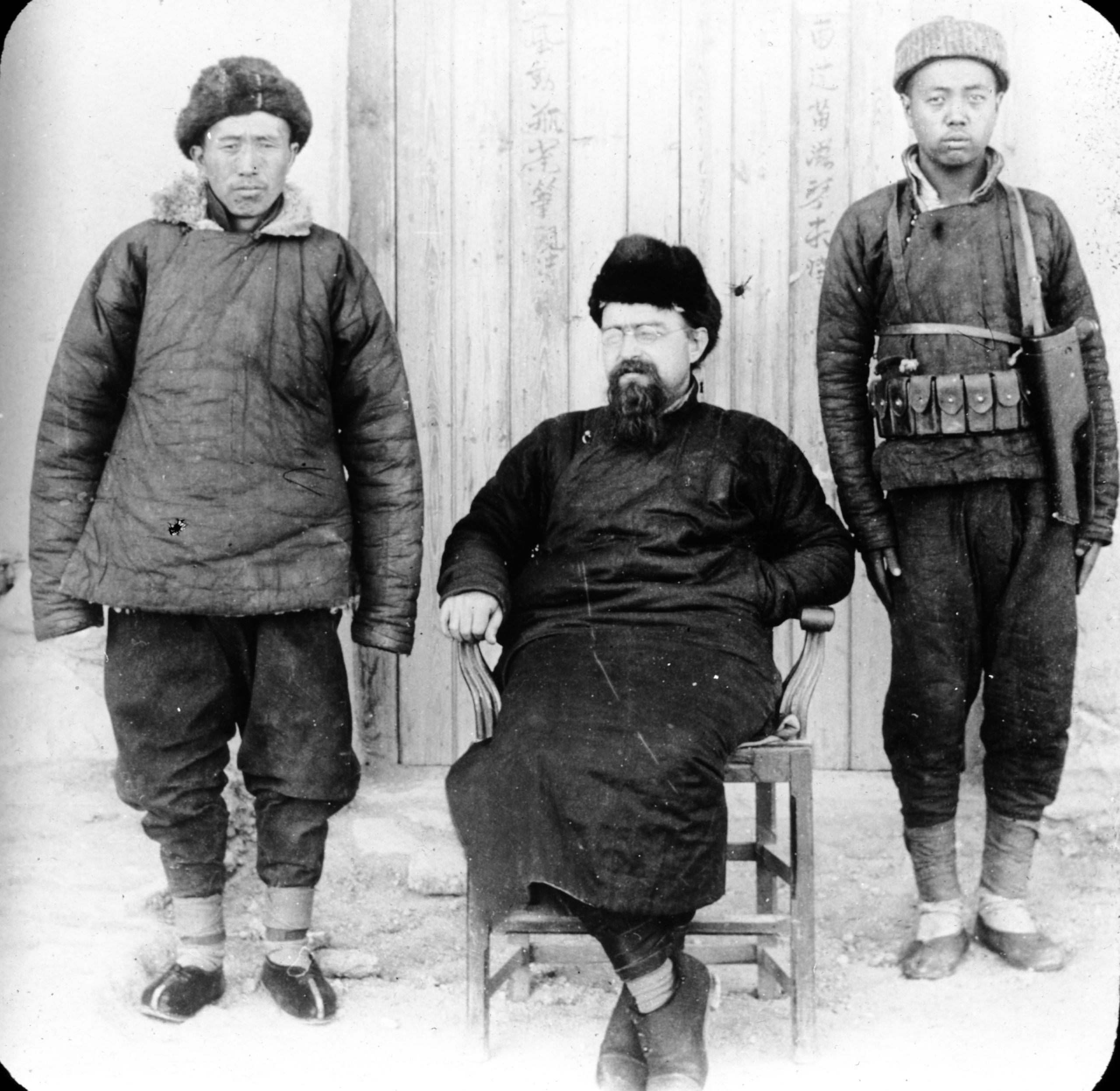
Major Gen Chao at Pao T'ao and Suiyuan
Major Gen Chao at Pao T'ao and Suiyuan
The following letter was sent by HGT to his wife, Mrs Amy Thompson, at their home in Yunnan-fu.
The RC mission at Ta Noor
Jan. 30 (1924)
My own dearest one
Here I am safe and sound at the R.C. mission at Ta Noor about 40 Li South of Pao T’ao, under the kindest care of Father Benoni de Wilde, a Belgian R.C. missionary.
I cannot tell you in a letter all that has happened since I was taken by the bandits on January 24, nor how it is that I’m here, though still a prisoner, yet only waiting while the negotiations for my release are completed – which will probably take some days more.
It is just been wonderful how the Master has cared for His child and when I get back and can tell you all – you’ll just marvel at it.
My thoughts have been constantly with you and our precious little ones and I trust now that it will not be long before I am with you all.
I had nothing left except the clothes I was wearing at the time of my capture, but in spite of the intensely cold nights and travelling at night, I was wonderfully provided for.
Now that I’m here - the Father, who speaks English, has just overloaded me with kindness and has just come back from a flying visit to their main station 2½ miles away – and he tells me that the Fathers there all send loving greetings and are praying for my speedy release and even the little children in the R.C. schools are praying for me every day.
They have provided me with urgent necessities – shirt – wadded trousers to keep out the cold – soap, towel, a comb, etc
But now my sweetheart – this letter goes in to Pao T’ao by the Father, who is also negotiating the release of another R.C. priest, one of their Fathers, who is in the hands of another lot of bandits in the same district.
It would not be wise to write down details so these must wait a little longer.
The first thing I did after I arrived here was to help the Father to word a telegram to Peking and ask them to cable you that I’m safe.
Now I must close as it is late and the Father leaves tomorrow morning at 6 a.m. to visit the other prisoner 60 Li away, and then go in to Pao T’ao.
Goodbye for just now
Best love to you each one
Your own boy
Hubert
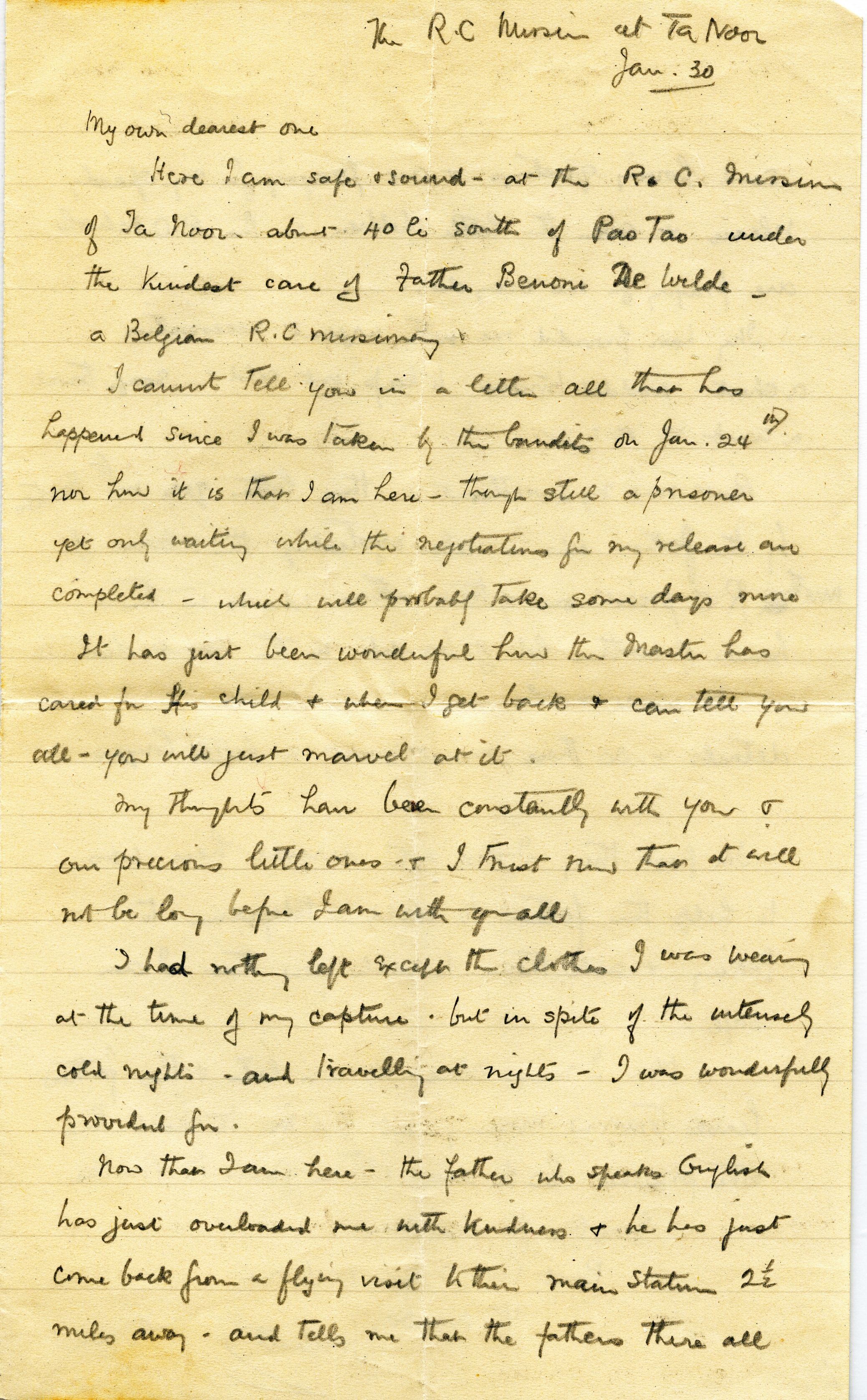
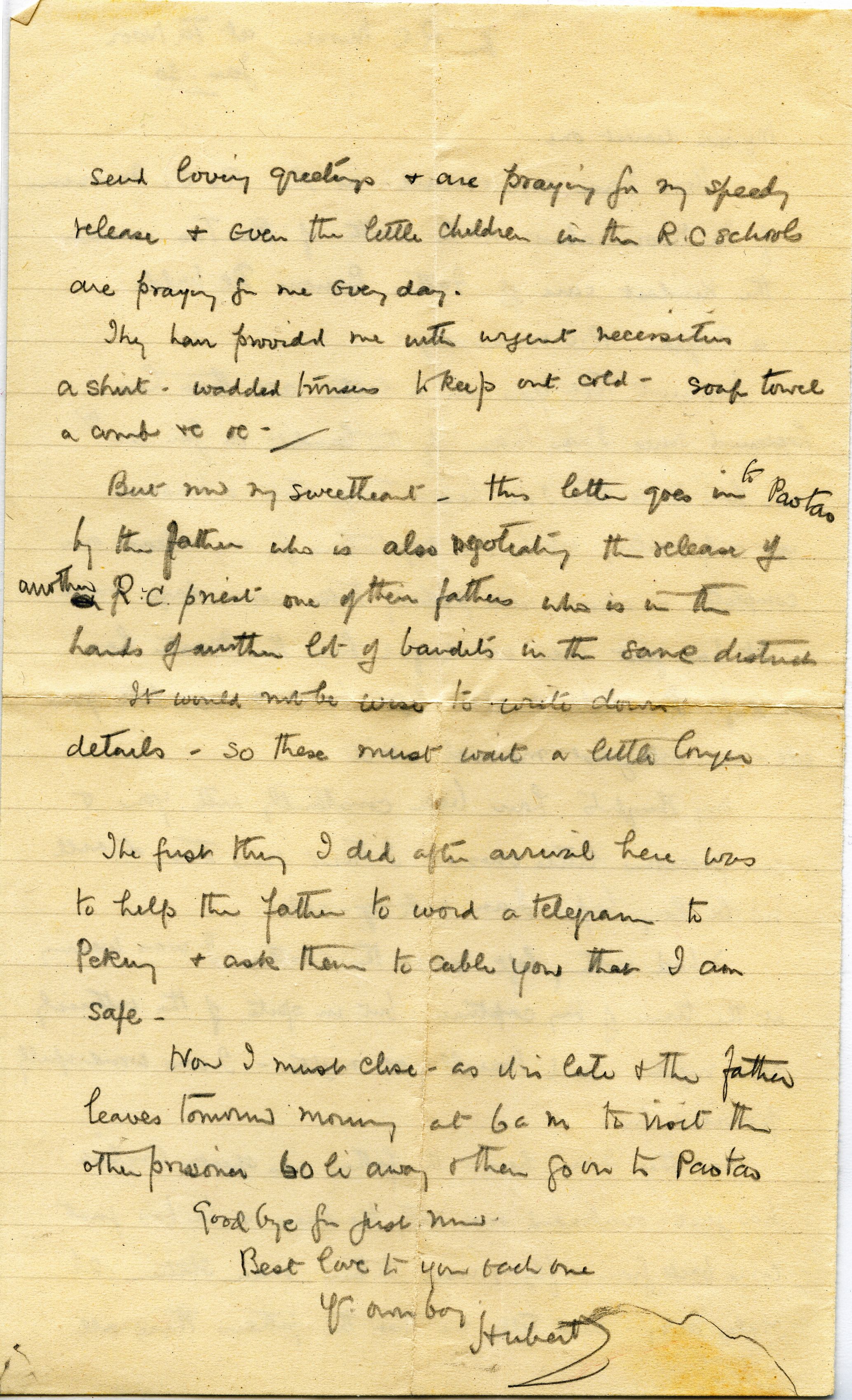
Hong Kong
February 1924
Eventually, after a de-brief at the British Embassy in Peking (Beijing) with the British Ambassador Sir Ronald Macleay, HGT travelled by train to Shanghai and then on to Hong Kong where he was reunited with his beloved wife Amy and their children from where they later returned to Yunnanfu.
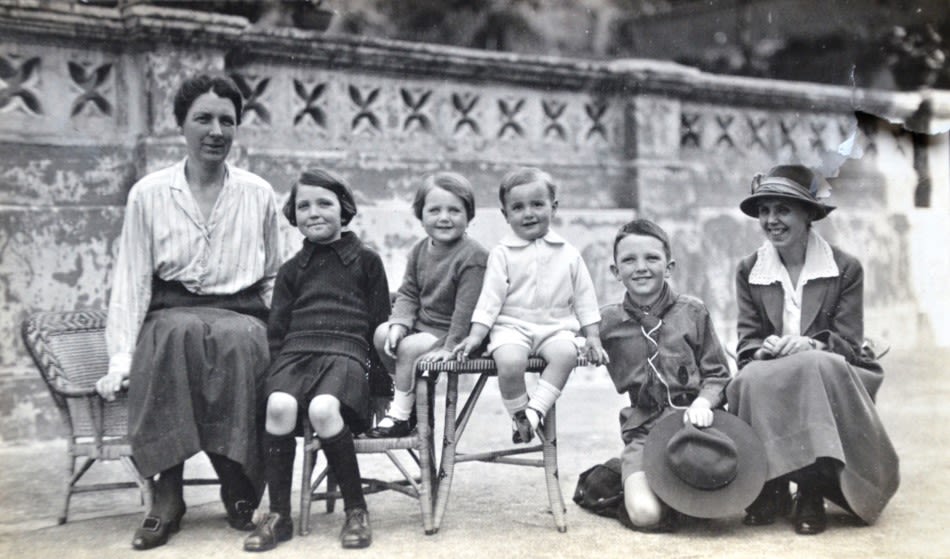
Mrs Amy Thompson (wife), Greta (daughter), Mary (niece), Peter (son), Arthur (son), Gertrude Lindsay (sister) Hong Kong February 1924
Mrs Amy Thompson (wife), Greta (daughter), Mary (niece), Peter (son), Arthur (son), Gertrude Lindsay (sister) Hong Kong February 1924
The story of HGT’s travels, his captivity and eventual escape was told at a lecture he gave to the Meeting of the Royal Geographical Society, on 23rd November 1925:
On 21st June 1926, it was announced that King George V had approved the Royal Geographical Society's Gill Memorial Award to Dr Hubert Gordon Thompson. He was also made an Honorary Fellow of the Royal Geographical Society.
As I mentioned in Part 1 of this account, HGT's journey also featured in two editions of the Illustrated London News – 30th January and 6th February 1926.
Copyright © 2021 John Hague. All Rights Reserved
Special thanks to Mr Edward Pereira, great nephew of Brig. Gen. George Pereira for providing me with copies of his great uncle's journal.
References:
The Geographical Journal Vol. LXVII No. I
The Royal Geographical Society January 1926
Published by Edward Stanford 1926
Peking to Lhasa by Sir Francis Younghusband.
The Narrative of Journeys in the Chinese Empire Made by the Late George Pereira . Compiled by Sir Francis Younghusband from Notes and Diaries.
Published by Houghton Mifflin, Boston, 1926
The Illustrated London News
No 4528 Vol 168 published on 30th Jan 1926
and
No 4529 Vol 168 published on 6th Feb 1926
